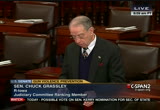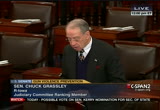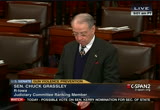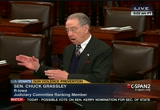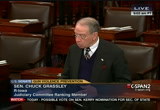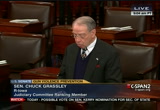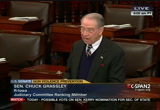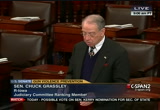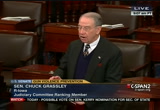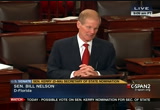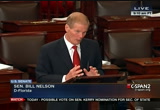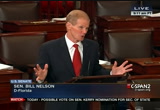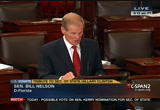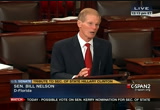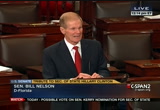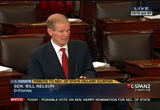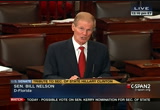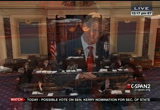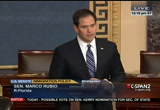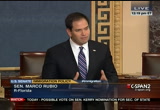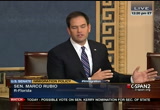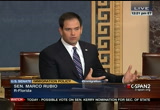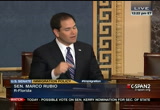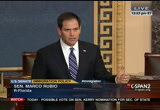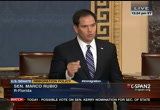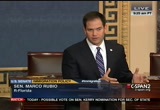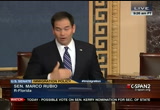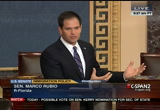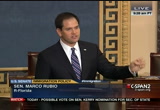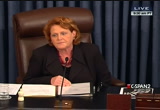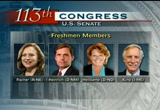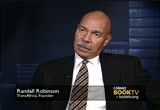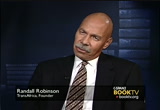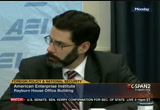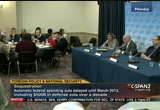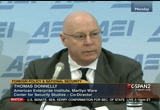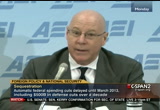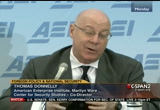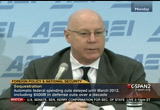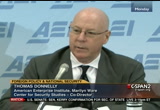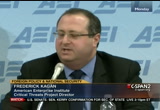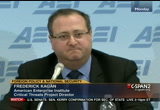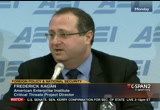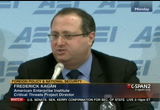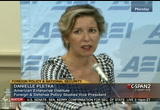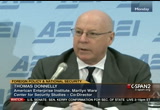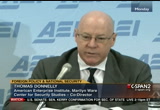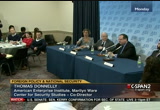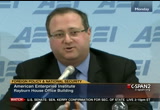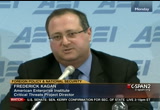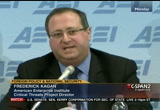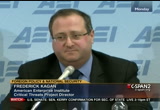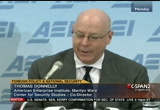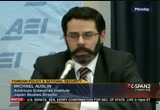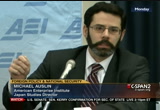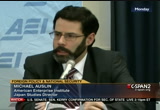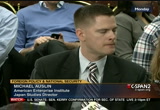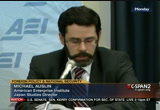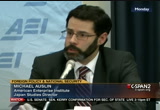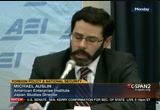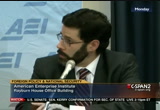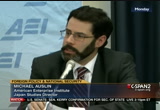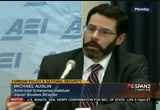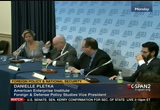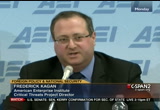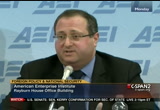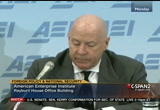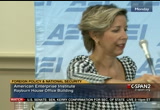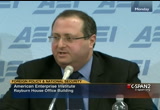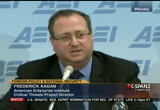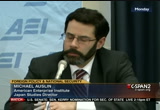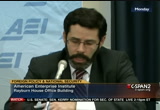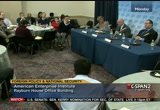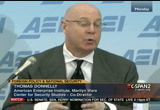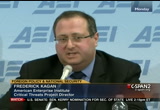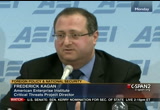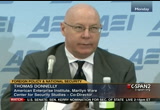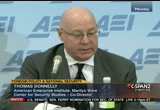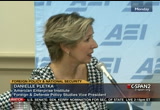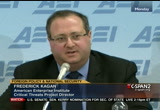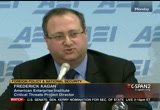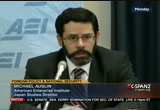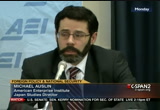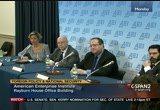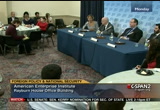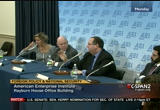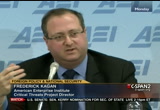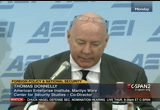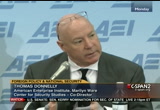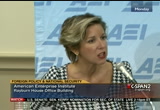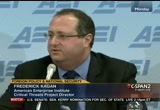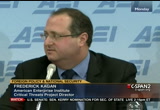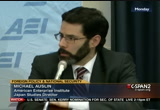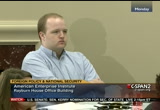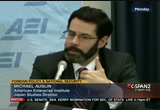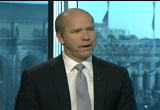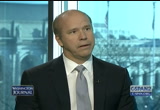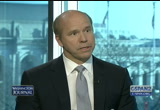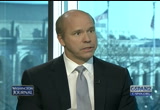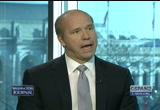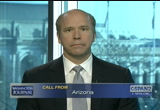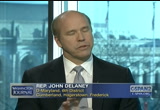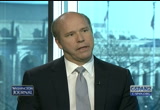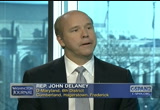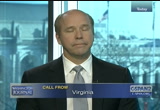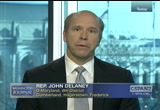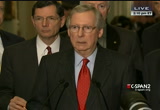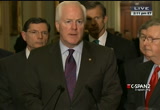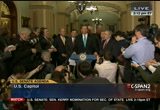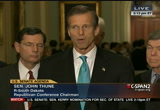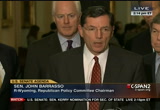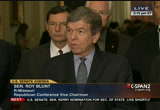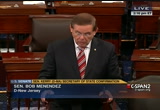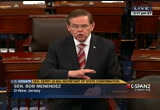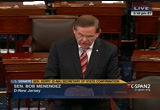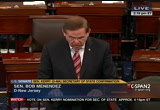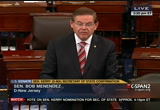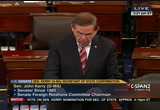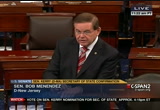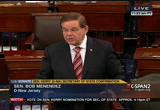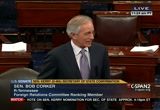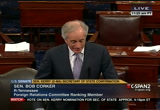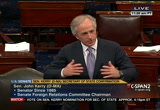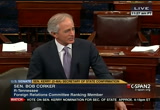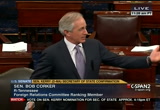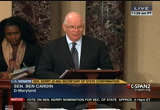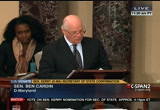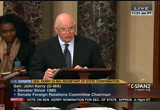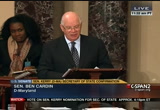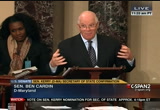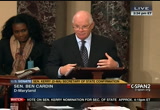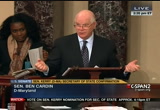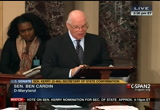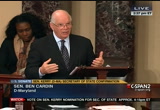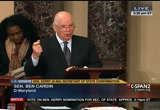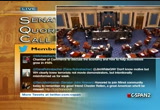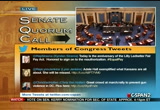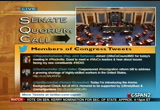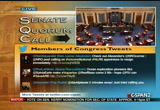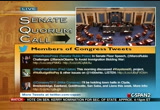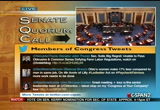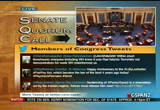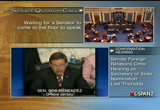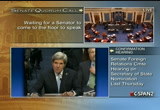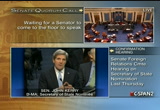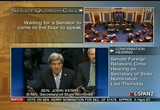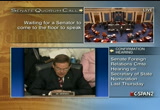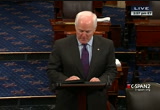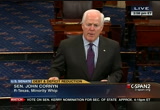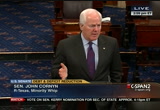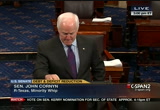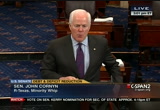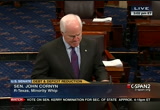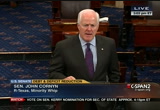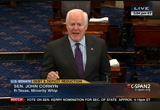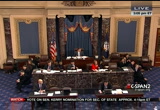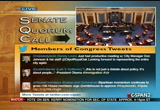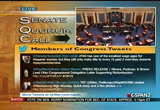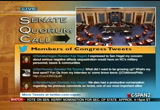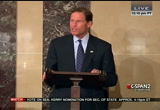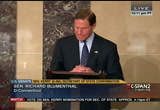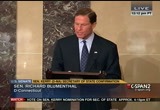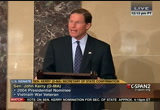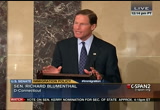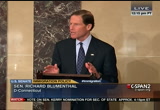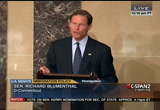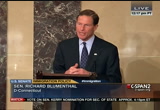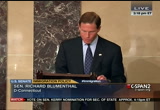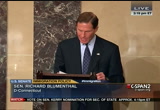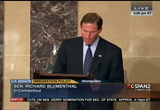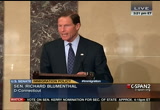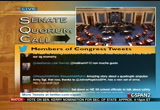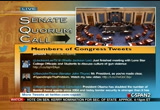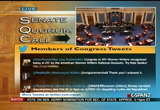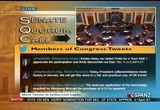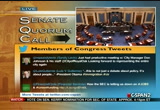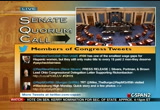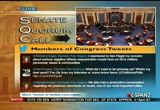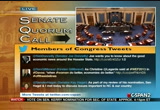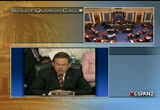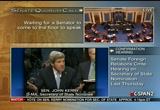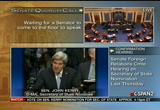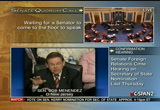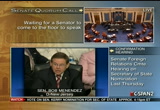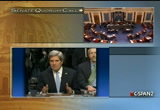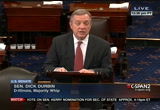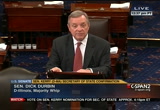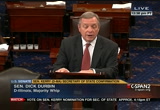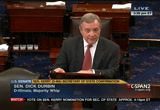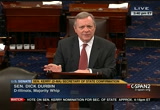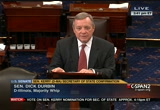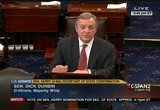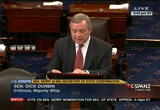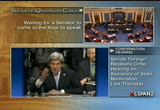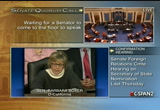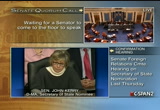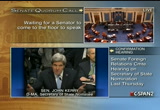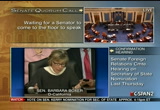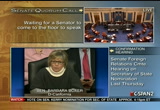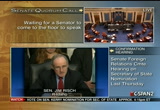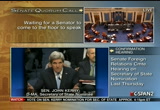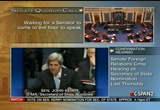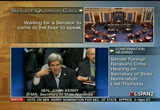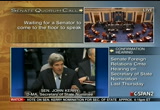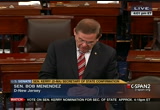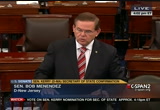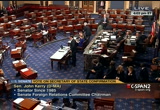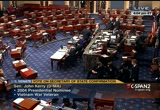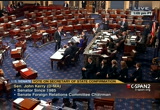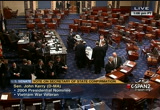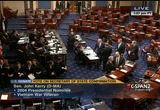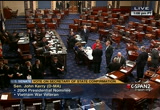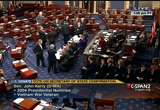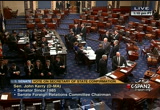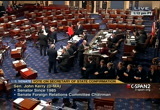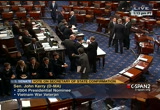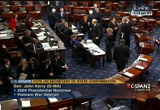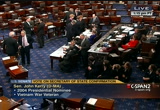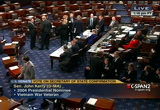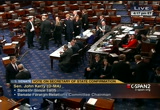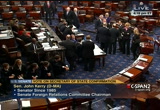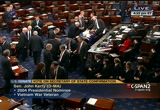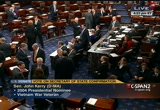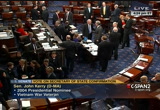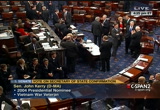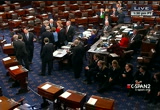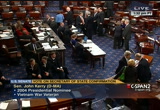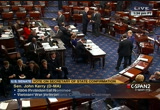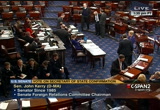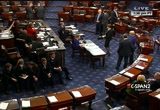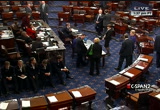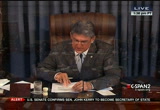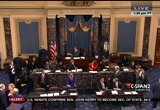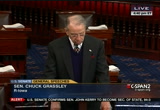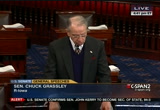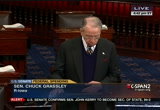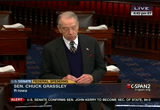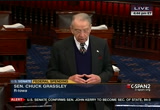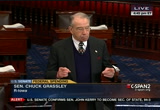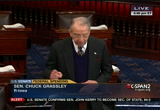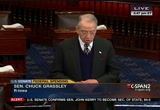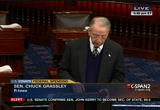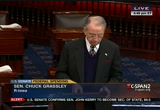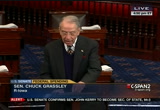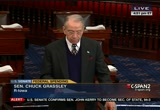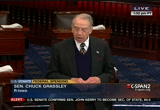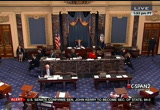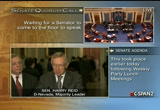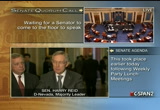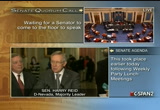tv U.S. Senate CSPAN January 29, 2013 12:00pm-5:00pm EST
12:00 pm
declaration of independence. let us consider first principles -- the declaration of independence listed grievances against british government action that violated individual natural rights of the colonists at that time. the declaration did not raise grievances against individuals or grant powers to government. the constitution exists to create a limited federal government. as madison wrote in "federalist" number 51 -- quote -- "in framing a government which is to be administered by men over men, the great difficulty lies in this -- you must first enable the government to control the governed and in the next place oblige it to control itself." end of quote by madison,
12:01 pm
"federalist paper" number 51. in other words, the government of the united states under the constitution is a limited government and the constitution is to protect the people from the government, not for the government to give people rights and powers that the government then, in turn, could take away. on the other hand, the constitution does give broad powers to the federal government but it separates them among branches and between the states and the national government. the framers believed these structures would adequately control the government so as to protect individual liberty. but the american people disagreed. they believed that the constitution gave the federal government so much power that it could be tyrannical and violate
12:02 pm
individual rights. so as a condition of ratification, they demanded and received assurances that a bill of rights would be added to the constitution. now, each of those rights, including the second amendment dealing with guns, was adopted to yet further limit government power and to protect individual rights. in other words, the people that wrote the constitution in 1787, in the spirit that they believed at the time, the constitution, just the way it was originally written, was adequate to protect individual rights. but you were not going to get the constitution adopted without the promise of a bill of rights, so the bill of rights went yet further. but the bill of rights is not a limiting factor, as evidenced by the ninth amendment, which says
12:03 pm
none of the previous eight amendments in any way disparage the rights of citizens. in other words, all those natural rights that are too big, that you can't even enumerate them. and then, of course, the 10th amendment went on to say that all powers not specifically given to the federal government are reserved to the -- to the -- reserved to the states and the people thereof. now, none of these bill of rights applied to the actions of private individuals or granted power to the federal government, so how far was the president's remarks from the intent of the constitution framers? president obama's remarks turned the constitution on its head because he said -- quote -- "the right to worship freely and safely, that right was denied to the sikhs in oak creek,
12:04 pm
wisconsin." continuing to quote, "the right to assemble peacefully, that right was denied shoppers in klakamous, oregon, and moviegoers in aurora, colorado." continuing to quote: "that most fundamental set of rights to life, liberty and the pursuit of happiness are fundamental rights that were denied to college students in virginia tech and high school students in columbine, and elementary school students in newtown." mr. president, this is incorrect because except for the prohibition on slavery, the constitution only limits actions of government, not individuals. when a criminal commits murder, no constitutional right is violated. so, for instance, the right to
12:05 pm
peacefully assemble is all about protecting individual rights to organize, to protest, or seek to change government action. it is violated, for instance, when government officials hose down civil rights protesters on the sidewalk. that right is trivialized and mischaracterized as protecting shopping and watching movies. and those constitutional rights are not a source of government power to enact legislation as i think the president has suggested. quite the opposite. they are designed solely to preserve individual autonomy as against the government. protecting individual rights rather than expanding governmental power may be particularly appropriate in addressing mass killings.
12:06 pm
one of the threen so many people died in some of the tragedies that the president cited was the failure of government, the federal government, the state government or the local government but government generally to protect its citizens. police not on the scene cannot arrive at a mass shooting, such as newtown, in time to stop it. at columbine, the police employed techniques that are no longer used because they did not stop killings that occurred after their arrival. at virginia tech, government officials made decisions after the shooting started that some even have argued may well have led to unnecessary deaths. the president cited constitutional protection of individual rights as a basis for expanding federal power against private individuals. now, no wonder millions of
12:07 pm
americans fear that congress could enact legislation that could lead to a tyrannical federal government. i cannot accept the president's claim that -- quote -- "there will be politicians and special interest lobbyists publicly warning of a tyrannical, all-out assault on liberty, not because that's true but because they want to gin up fear." end of quote of the president. the president reads the constitution differently than it has ever been understood as a source of power against individual rights rather than a check on government power that guarantees those individual rights. this necessarily and understandably leads many citizens to fear that their individual rights will be violated. and that extends well beyond the second amendment. it should be a matter of deep concern to all of us when you have a president that wants to
12:08 pm
use the power of government to corral individual rights. the constitution for 225 years has established a government that is a servant of the people not the master. madam president, as the judiciary committee and all of us consider and debate legislation arriving from the tragedy at newtown, i hope we will proceed with the proper understanding of the relationship that the constitution establishes between governmental power and individual liberty. i yield the floor. mr. nelson: madam president? the presiding officer: the senator from florida. mr. nelson: madam president, i have three unanimous consent requests for committees to meet during today's session of the senate. they have the approval of the
12:09 pm
majority and minority leaders. so i ask unanimous consent that these requests be agreed to and that these requests be printed in the record. the presiding officer: without objection. mr. knel nelson: madam presideni want to speak about the extraordinary public service that has been rendered by the secretary of state, whose long record of public service i want to commend. i rise on behalf of our friend, our former colleague, our honorable secretary of state, hillary clinton. she has represented the world. she is a world figure. she has represented america to the world and especially with
12:10 pm
her diligence, her grace, her hard work and her incredible diplomatic skill. she's traveled to 112 countries. she racked up a million miles, met with thousands of foreign dignitaries. she's reached nearly every corner of the globe and made history on the way. and in each assignment, she has left an indelible mark, empowering women, supporting sustainable development, supporting the establishment of civil societies, and promoting the tenets of democracy: one man, one vote, one woman, one vote, human rights, and the rule of law. mr. nelson: now, i might note that she particularly has underscored the plight of women.
12:11 pm
and, of course, we know as we see societies that live almost in another time and age centuries before in the way that they treat women. the secretary of state has tried to help modernize those societies, and she's done so by empowering and appointing one of her personal friends, milan vivier, to be the global ambassador for women's affairs. and that position has taken ambassador vivier all over the globe. and i might say that it's -- it's been my privilege to have a glimpse of that by seeing my wife, grace nelson, work with milan on the plight of
12:12 pm
poor women in so many different countries across this planet. when our secretary of state confronts major national security challenges, her support has been pivotal from the support that she gave the president in the raid that took out bin laden, to the drawdown of u.s. troops in iraq and afghanistan. she's been at the forefront of some of the toughest decisions of our time. the secretary has also been steadfast in per situating the international community to enact crippling sanctions on iran to isolate and to punish a regime for its pursuit of nuclear weapons. and i might say on a personal note, in a floridian that has
12:13 pm
been missing for almost six years, who was suddenly swept up and disappeared on the iranian tourist island of kisch island in the persian gulf, the secretary has kept very vigilant in continuing to search for any piece of evidence of bob levinson and ultimately to bring him home. and i thank the secretary not only for floridian floridians ss myself, but for a wife, christine levinson, and seven children who want their father home. that quest continues unrelenting by many people, and i just want to say thank you to secretary
12:14 pm
clinton for the efforts that she has lended to this. she's been one of the driving forces behind nato's no-fly zone over libya in order to prevent qadhafi from massacring his own people. and through deft diplomacy, she has slowly opened burma to the outside world. she's encouraging them to free political prisoners, hold parliamentary elections and finally permit foreign investment. and it's happening before our eyes. and, of course, she has taken special interest in the poorest nation in the western hemisphe hemisphere, an island nation right off of the east coast of the united states, less than an hour and a half flight time from
12:15 pm
miami. that's the island of haiti. the island nation of haiti on what is an island that christopher columbus was expected to have been the island that he landed, hispaniola now encompassing haiti and the dominican republic. and she has made haiti one of the top foreign policy projects, helping the impoverished island build back better after the devastating earthquake that killed over a quarter million people. in no small measure has her husband -- president clinton -- been a part of that attempt at restoration of haiti from that devastating earthquake. last week during secretary clinton's final appearance before the senate foreign relations committee, she said --
12:16 pm
and i quote -- "every time that blue and white airplane carrying the words "united states of america" touches down in some far-off capital, i feel again the honor it is to represent the world's indispensable nation. madam secretary, you have truly honored us with your indispensable leadership. and on behalf of all of our senate colleagues, we want to thank you for your extraordinary service to this country. and i want to say that your position will be in capable hands with our colleague and your former colleague, senator john kerry, who will serve as we confirm him in the next 24 hours as the 68th secretary of state. senator kerry has served in this
12:17 pm
senate in a distinguished amount of public service since 1985. he grew up traveling the world with his father in the foreign service. he fought in vietnam and was awarded the bronze and silver stars along with three purple hearts. i know he is going to build upon and continue the legacy and the extraordinary record of secretary clinton, and will enhance america's leadership in the world. i look forward to his speedy confirmation. madam president, i yield the floor. a senator: madam president? mr. rubio: madam president? the presiding officer: the senator from florida. mr. rubio: let me begin by
12:18 pm
thanking the senior senator from florida a few moments ago made some very kind remarks about me and i appreciate them very much. let me say you're the best python hunter in the senate. those who don't know what i'm talking about can look it up in your newspaper accounts a few weeks ago in the everglades. thank you for your kind words. madam president, i heard a lot of discussion today on the floor. we were talking about the stem visas and the need to reform that process. i want to take a step back and talk about the immigration issue in general. there's been a lot of conversation about that here on the floor of the senate, certainly out in the american public. this is a contentious issue, and i think it's clearly important to understand where we stand today, what it is that's happening, what it is that's not happening and the way forward in that regard. i hope i can do that if under ten minutes this afternoon. let me begin by saying something that i think unifies all of us. that is the belief that legal immigration is good for america. legal immigration is a good thing for our country. and the vast majority of americans would agree with that.
12:19 pm
legal immigration has been a critical part of our heritage and it is a critical part of our future. we discussed one aspect of legal immigration critical for our future and that is the technology field. if you go into the agricultural industry, they will tell you the same thing. legal immigration is good for our country. it's important for our country. the second thing people will tell you that illegal immigration is not good for america. i know both sides of this coin firsthand. i didn't read about this in a book. i didn't watch some movie last week about immigration. i lived this issue on a daily basis. i live in a family of immigrants, married into a family of immigrants, in a neighborhood of immigrants, in a community of immigrants. i see all the good things that legal immigration has done for america, and i see the strain that illegal immigration places on our country. we have a fundamental problem in america today, and that is that we have a broken legal immigration system and we have a very serious illegal immigration problem. and those are the things that we are trying to address in a
12:20 pm
commonsense way that's good for america. and what you saw yesterday was the release of some principles. it's not a bill. it's some principles. basically the architecture of the work that we hope to undertake in conjunction with every one of my colleagues here. it is not a secret group that is going to meet and force some issue on you to take it or leave it. it is the beginning of a process we hope will lead to a real solution. part one is we need a legal immigration system that works. in fact, our broken legal immigration system is a significant contributor to illegal immigration. it is so expensive, so complicated sometimes to legally emigrate to the united states or renew a visa that it is encouraging people to do it the wrong way. we have a system that doesn't reflect the reality of the 21st century, and that needs to be addressed. that is one of the top priorities of this system. the second priority is this: this is a sovereign country. as a sovereign nation, the united states of america has a right to have immigration laws and it has a right to enforce our immigration laws.
12:21 pm
and that's important to point out sometimes. we lose sight of this, that we have a million people a year emigrate legally to the united states permanently. no other country in the world is nearly as generous. there isn't a close second. a million people a year who wait in line and pay the fees and come here the right way. and so if you don't enforce the immigration laws, you're undermining that effort. in fact, you're discouraging it, being unfair to it. so we need to have immigration laws that work and that are enforced. but we have a third problem, and that is right now in this country at this very moment estimates say that as many as 11 million human beings are in the united states without proper immigration documentation. let me be clear on the one hand, the vast majority of these folks are not victims. they knew what they were doing and what they did was wrong. they don't have a right to illegally emigrate to the united states. there is no such thing as a legal right to illegally emigrate to the united states. on the other hand, these are 11
12:22 pm
million human beings. 11 million people who irrespective of how they did it, came here -- the vast majority of them -- in pursuit of what every one of us would recognize as the american dream. so as a policy-maker, as someone who passionately loves this country, as do all my colleagues and everyone watching, i realize we have 11 million people here who are undocumented. what they did was wrong but they will probably be here, almost all of them, for the rest of their lives with or without documents. so what i want to do is say okay we need to deal with this. we need to modernize our legal immigration system. we have to deal with the 11 million people that are here now in a way that makes sense. not a talking point. and we have to make sure this never happens again, that we never find ourselves back where we are right now. i hope i never again in the future have to come back here and say guess what, folks? we have another five million people here undocumented. let me be clear i personally will not support any immigration bill that does not prevent that from happening. but it all starts with dealing with the reality that we have 11
12:23 pm
million human beings who will be here the rest of their lives with or without documents. we have to deal with that. what these principles say is, one, let's modernize our legal immigration system, have an agriculture program that works, a high-tech visa program that works. we have to have a 21st century immigration system which means we can no longer afford to have less than 10% of the people who come here come here based on skills. we need to change that not by undermining family-based immigration but reforming the program we use for skill-based immigration. the second thing, we need real enforcement mechanisms. there are three things that work. one, securing and getting operational control of the border. this is not just an immigration issue. the border is not just an immigration issue. i'm not in favor of a housekeeper or landscaper coming across the border illegally. but what keeps me up that night is a terrorist coming across the border. a porous border, the north and south leads to that possibility. the border is as much about our sovereignty and national security as it is about
12:24 pm
immigration. the second thing is workplace enforcement mechanism. in the 21st century, we can't come up with a reliable way to verify whether people here are legal or not. the third thing is visa tracking. all these people that come into the u.s. on visas, we track when they come in. we don't track whether they leave or not, not successfully enough. 40%, as much as 40% of our illegal immigrants, 40% of our undocumented folks are here on visa overstays. they didn't sneak across the border. we have to deal with those three things as well. then we have to deal with the 11 million. the way to deal with them is not blanket amnesty. what my principles outline is a process that works this way. if you are here undocumented, you must come forward. there will be a background check conducted on you. if you have committed serious crimes in the united states you will be deported. if you have not committed serious crimes in the united states you will then have to pay back taxes and you will have to pay a fine. and what you will get is
12:25 pm
basically the equivalent of a nonresident visa that allows you to work here. you do not qualify for federal financial benefits, so you are not a strain. i've heard that concern raised, this is going to place a strain on our social services. as a nonimmigrant visa holder you do not qualify -- under existing law now you do not qualify for federal benefits. what you get is a work perm. the ability to be here legally. we know where you are, we know where you live. you pay taxes. you've paid a fine. this is not amnesty and you have a nonimmigrant visa. there is nothing you can do with that visa is stay here and work. you can travel to visit relatives. you can't turn that into citizenship. they will have to remain in that probationary phase for a significant period of time, not an unreasonable period of time but a significant period of time. after that period of time elapsed and if they have complied with all the requirements of that probearingsary period and if -- probation ary period and if it is certified the enforcement
12:26 pm
mechanisms are in place and have happened -- that is critical -- then and only then do we then move to phase two. this is what phase two is. it is very simple. we will now go to these folks and say you will now be given the opportunity to apply for a green card using the same process as anybody else anywhere else in the world will apply. in essence, all we're going to give them is a chance to do what they should have done to begin with. all we're going to eventually give them is a chance to apply the way they should have applied from the beginning. here's what's important. they'll have to get in line. people say what's the big deal about the line? the big deal about the line is all those people who have done it the right way, it is not fair to them to allow someone who didn't do it the right way to leapfrog them. we can't make it cheaper and faster to emigrate here illegally than it is to emigrate here legally. ultimately they will have to get in line. they'll have to qualify for the visa they applied for. if all that works out, then they will get a green card. once you have a green card, depending on how you got it, you will have to wait about five
12:27 pm
years before you can even apply for citizenship. this is the process and the principles we have outlined. i've heard concerns, they are all legitimate concerns. i want to say something. just because someone raises concerns about our principles doesn't mean they are ultimately be against it. that means they have legitimate concerns. people say it is wrong to reward people who have done this the wrong way. that's why you can't allow them to leapfrog anyone. that is why the line is important and the waiting period is important. i heard senator sessions earlier say we're not even enforcing our current laws. that's true. one of the reasons why they're not being enforced is because the kerpbt system doesn't -- current system doesn't work, it doesn't work. we have de facto amnesty. if we do nothing what we have is de facto amnesty because we don't know who the undocumented are. you couldn't enforce it even if you wanted to. that's why we have to deal with this issue. they talk about the cost of social programs. if you're on a nonimmigrant visa, you don't qualify for social programs by current law. there's a lot of work to be
12:28 pm
done. what we announced yesterday is not a plan. it is a framework. and that framework has to now be turned into legislative language. that's a lot of hard work, but i hope people will take this as an opportunity to come up with a solvable -- with an issue that is solvable, that we can address, that we can bring conclusion on. and it will have to be done the right way and it will not be easy. in a few hours the president will give a speech in nevada. and early press accounts concern me. i don't want to turn this into a partisan thing but let me just say this. if this endeavor becomes a bidding war to see who can come up with the easiest, quickest and cheapest pathway to green card possible, this thing is not going to go well, folks. we have now a very commonsense and reasonable set of principles, and i hope what the president will say today is that he hopes that process succeeds. but if his intentions are to trigger a bidding war to see who can come up with the easiest process, this is not a good start. but let's give him the benefit of the doubt. i hope my colleagues will do the
12:29 pm
12:30 pm
sproeup. the presiding officer: the majority leader. mr. reid: madam president, i ask unanimous consent at 2:15 today the senate proceed to executive session to consider executive calendar number 1, nomination of senator john kerry tor secretary of state, two hours for debate equally divided in the uranium form. upon -- in the usual form. upon the use or yielding back of that time the senate proceed to vote on that nomination, that the motion to reconsider be considered made and laid on the table and there be no intervening action or debate, that no further motions be in order and any related statements be printed in the record and president obama be immediately notified of the senate's action and the senate then resume legislative session. the presiding -- the presiding officer: without objection, so ordered. under the previous order, the senate stands in recess until senate stands in recess until
12:31 pm
>> the senate gaveled out until 2:15 p.m. this afternoon senators are expected to take up consideration of massachusetts senator john kerry's nomination to be the next secretary of state. earlier the foreign relations committee approved moving that nomination to the false and. live coverage when the senate returns here on c-span2. with the 113th congress seated come a look now at some of the new members of the senate. deb fischer who fills the seat left open by the retirement of ben nelson who served eight years in the state legislature. the mexican democrat martin heinrich served on the albuquerque city council for two terms and the u.s. house for new mexico's first district. district. he replaced senator jeff bingaman who retired. also heidi heitkamp of north dakota served as her states tax commissioner from 1986-1992.
12:32 pm
and independent senator angus king served as a mains governor from 1995-2003. he is announced although he is independent he will be caucusing with democrats during this session. he replaced senator olympia snowe who also retired. yesterday a bipartisan group of senators unveiled their proposal for brought immigration legislation, added a president obama will outline his plans during a speech in las vegas. he will be speaking at 2:55 p.m. eastern and southern las vegas. you can watch live coverage on our companion network c-span, followed by your phone calls. >> one can't count the times americans say that we are the best country in the world. what a marvelous list of things.
12:33 pm
of all the countries, everybody thinks this country is pretty good. why do we have to believe that we are the best? what does that mean? and why do we have to a circuit, all of the time? and what does it mean to other people who consume it? american products go around the world, information products go around the world. so you're served by people from every corner of the world. and we teach them not to like us. gratuitously. >> activist and trans-africa founder randall robinson taking your calls, e-mails, facebook comments and tweets.
12:34 pm
in depth three hours live sunday at noon eastern on booktv on c-span2. >> all of us work hard for causes way before we got to the white house. the white house just was an enormous push up your i think the ladies would agree that the day before you are married to the president, no one gives a dog which is a. and the day after his president-elect, everyone thinks you're brilliant and your causes are good. >> that helps. [applause] >> c-span's new original series, first ladies come influence in image, public and private lives, interest and influence on the president. produced with the white house historical association. season one begins presidents' day february 18 at 9 p.m. eastern and pacific on c-span, c-span radio and c-span.org.
12:35 pm
>> yesterday the american enterprise institute hosted a panel of scholars briefing president obama's upcoming state of the union address and how foreign policy and national security will be addressed in the president a second term. this is about an hour 20 minutes. >> good afternoon, folks. [inaudible conversations] >> good afternoon, folks. can i get everybody to sit down and chew quietly? thank you. i think we will start. good afternoon, everybody. i'm danielle pletka, vice president for foreign and defense policy studies at the american enterprise institute. welcome to the first in our annual series of state of the
12:36 pm
union policy event. every year, aei scholars come together. we look forward to the challenges of the year ahead and policy questions that have been raised, and are likely to come up, and try and look forward a little bit, think a little bit about what the right answers are to the questions that are being posed. one of the few events we do with only aei scholars, although i'm very happy to be together with them. i will lay out for you what the other events are at the end of the session but let me introduce the folks who are here with me at the table. first on the far left, so to speak, is -- sort. on the far left is a resident scholar at aei and asian studies, specializing in japan although he does a lot of work on pacific and air power as well. next to him is fred kagan, another resident scholar at the american enterprise institute, the christopher demuth chair,
12:37 pm
and the executive director of our critical threats project. and next to me is tom donnelly, resident scholar at aei, and the codirector of our marilyn ware center for security studies. we are going to try and have a bit of the conversation here, although because we have three microphones, an it barely from e year 1974, that maybe a little e bit difficult but i know that you'll be patient with us as we try and go back and forth a little bit and make it more lively for you. it will keep you awake and it will perhaps keep us awake as well if we jump back and forth and talk about issues that are facing us in national security and we will stop about half an hour before the in an open things up to questions from everybody. because we don't just have a hill audience here today, we also have an audience on the outside, we will talk a little bit more fully and less in shorthand about some of the issues that is at the are very familiar to all of you, sequestration, things we can refer to in a word.
12:38 pm
i will ask my colleagues to be a little bit more wholesome and describing them just so we can have a complete discussion with the rest of the world to watch this on streaming video. in any case we have a state of the union address coming up soon. i suspect much like the inaugural address that president obama gave, it's going to be pretty light on national security. because national security it turns out isn't really a huge priority right now. we are called nation building here at home, something that not just candidate obama, but also candidate romney agreed about. we are looking at unprecedented cuts in spending on national security. we are looking at the prospect of drawing down and, drawing down from afghanistan. we are looking at a lot of changes. not just here in the united states but in the world. one of the questions i know that we have is whether we are ready
12:39 pm
for those changes. i suspect that most of us believe we are not. tom, maybe you could start out and talk a bit about the sequestration that paul ryan told us this weekend is quote going to happen. i'll give you the mic. >> well, it's a prediction that at this point seems like a certainty, but i would argue it's near certainty. once the sequestration provision was written into the budget. sal talk a bit about sequestration per se, but i really regarded as a symptom and not the disease itself. the disease itself is the erosion of the point of vanishing almost of the bipartisan political consensus for military strength, for key strength, people used to see.
12:40 pm
and that's really something that over the course of my career has been a touchdown that people could build upon. you could argue about what kind of strength we could have, the quality of the strength these forces versus those forces. but there was a broad-based bipartisan condition that american military power was necessary, necessary conditions in a dangerous world. and that was a good thing. so i think both those underlying pieces of political consensus has evaporated. let's talk a bit about sequestration and the gruesome budget numbers the defense department faces. so, danny mentioned mr. ryan has acknowledged again what i would say this sort of been in the cards from the start, that there's going to be yet another round of defense cuts. this year, about $55 billion
12:41 pm
will be sequestered, in ways that will be uniquely injurious to the department. it's not just that this is an automatic across the board meat cleaver approach. but there was some wiggle room granted to the president, and particularly he is chosen to preserve personal benefits. so that cuts that have to be made coming as they will come, about halfway through the budget year, will fall disproportionately on weapons procurement and research, but in particular on the operations and maintenance accounts that go for making trained and ready units for deployment. and because the so-called owing to him set of accounts also includes things that are sort of automatic like a certain amount of health care spending, for defense health programs, it
12:42 pm
means that an even larger burden will fall on those relatively rapid spending accounts that are most directly associate with making units ready to deploy to combat theaters. i'm sure the department will say, in fact last week chairman dempsey said we are going to sort of manage these cuts in a way so that non-critical readiness accounts will be protected. well, when you come down to it is not much that is a pretty critical to readiness. things like the money that goes to get people to show up in units at the right time, buying ammunition and gasoline to do training with. paying the contractors who run the ranges, and masquerade as enemy combatants at training centers, so one and so forth. so the idea that this is not going to have a pretty good
12:43 pm
effect on combat effectiveness of guys and gals are going into harm's way, it is sort of, you know, just a fiction. but that again is the immediate effects of sequestration. it's possible that a budget deal of some sort or even more likely that the presidents 2014 budget will chart a course forward for the defense department that, where an sequestration level spending becomes the ceiling, not the floor. the president, me, again with an note real clear what is fake is other than what is revealed in his inaugural speech, but he is not a guy, he's a guy who believes in the tide of war is receiving. and even if the tide of war is increased seating is not much of a war the next issue get involved in and, therefore, we can afford to reduce military
12:44 pm
spending, investment and military power, reinvested elsewhere, not so much cut the deficit, but use the money saved for his priorities, his domestic priorities. >> [inaudible] >> oh, you want the mic back. spent this is the problem with is having three mics and i apologize. tom, i want to just sort of push on a question and then turned to fred to talk about the wars that we theoretically can fight. part of the problem is that it is a notion that we don't have the wars we want to fight. and that is in some ways and accessible notion. a man is elected commander in chief and he gets to make those decisions. the american people voted him into office again, and in some ways the president is absolute rights is just he has a mandate in these areas. the real question is the impact that these decisions have on the
12:45 pm
threat environment that the united states is in. for most of history we don't talk about this very much. we have maintained a strong military, not so that we can buy, so that we can not fight. it is a point i think that tom made which is important, it is i want to segue to fred, is to understand what it is that is involved in a military operation. fred has just finished a very important piece of work, i should a shorter longer, an interactive piece on the web that i know we be happy to share with folks that explains just what it is that we can do with particular numbers of troops we have as the president makes critical decisions about afghanistan but it's not just about warfighters and bureaucrats in d.c. fighting a war is a big logistical exercise. fred, do want to talk about that and some of those ceramic decisions? >> sure. if we become very accustomed to throwing numbers of troops around and people of gotten way too comfortable with pulling
12:46 pm
numbers out of the air and discussing them as though they were serious, and the effect of that is that very few americans i think actually understand that there is a method for figuring out how matrix are actually needed to publish something. and that when a recommendation comes from a military commander, it's not just as this white house seems to think, the commander asking for everything he thinks he might possibly get as a negotiating tactic because he always wants more troops. it is, in fact, the result of a very complicated staff process. that can only be performed by military staff. so when you hear numbers coming out of the white house you should be asking yourself, well, which military staff to the analysis to figure it how matrix are the required? as an example when the president talks about keeping 3000 troops in afghanistan, here's the problem. you can't. you can't keep a base in
12:47 pm
afghanistan with only 3000 troops. because once you start looking at what the concrete requirements are on the ground in order for those troops to be safe, in order for the strips to be fed, in order for those troops have ammunition to in order for the basic function of a military organization to be carried out, remember the troops need to be paid, forms need to be can subeditor all kinds of things we regard as tail, and that since the cold war, the days of the cold war we have regard as superfluous, are actually vital to keeping things working in the field. and so when you start asking questions like how many troops would we need at a base in afghanistan, you quickly say, well, which a base? because it managed it so you look a bagram which has a 10,000-foot runway which is a poor because you need to be able to land fully loaded cargo aircraft because it is a landlocked country which no reasoracing to be tracking on is entire discussion. so as my esteemed colleague david barno refers us blindly to
12:48 pm
somalia and yemen as models, he seems to me and many other seems to have forgotten the value of having a seacoast if you're trying to do logistics and offshore as a worker there is no offshore in afghanistan. so needs to a 10,000-foot runway. that means someone needs to secure the program around a 10,000-foot runway. that is a big task. we know what the threat is. for any groups have repeatedly attacked our bases with multiple truck bombs, followed by light infantry supported via rpgs and mortars and rockets. that is standard practice. so we know something about what kind of defensive perimeter is required. and we can count about that. other things that people don't tend to track on, do you want american soldiers in combat of medical care or not? do you want -- what is the attrition rate the president is going to accept? among wounded soldiers in the wars to which he is a sent them.
12:49 pm
because if you want soldiers to survive the kind of injuries that they encounter in these operations you need have something called a medical clinic summer into the. if you have one base it must be at that base. a role three medical clinic is 200 people. here's another fun fact that gets lost in the discussion. will do this all with creditors. we'll do this all with the drones and a great thing about drones is that their on demand aerial systems. i quote the tenet general of the united states air force on the subject of what a misnomer it is to call them unmanned aerial system big one thing that is a man is the actual playing. if you want to creditors on the ground -- predators on the ground, guess what, they need to be fueled. they need to be prepared, they need to be armed and you need to about 50 people on the ground for every creditor, every for predators that you want a. none of which is very interesting when you put 10, 20, 30, 50,000 hits in a theater which is one of the reasons why
12:50 pm
no one has heard of these kinds of discussions. but when you start getting down to the level of saying i want to have a cap of 3000 troops in the middle of the hindu push, then you have to start getting into these conversations. and what quickly becomes apparent is that even if my maximum use of contractors, or local security forces, if we like benghazi, we could maybe keep 3000 troops there. it would be, to coin a phrase, a self licking ice cream cone. it would be able to accomplish nothing, other than to defend itself. because we get rapidly over 3000 troop requirements before we get us are talking the troops required actually to do anything to any enemy. this is one of the reasons why it's a good idea in general terms to let professional military staff to actually go through a process called true task analysis, and figure out exactly what kinds of troops and what fridays are needed in order to publish a particular mission. it would be very helpful if the
12:51 pm
president of the united states order in troops into combat we take seriously the kinds of assessments that he receives from the people who know how to do this. >> i'd like to bring back to tom, but also i think fred, you have an answer for this as well. because the debate that we see going on over afghanistan is not just, it's not just a debate about afghanistan but it's not just a debate about the wisdom of staying there. it's about the nature of the fight as we move forward, 11 plus years now since 9/11 in the battle against al qaeda and related movement. so does -- yes afghanistan but elsewhere as well. the new, i'm about to say something i never would, but the new paradigm is -- doing my sites to greek pride. the new paradigm is the special forces. it's that we can do things by
12:52 pm
remote control, and with what i like to refer to as a lot of guys in beards with suitcases full of cash. they can make all that magic happen, and then we really don't need the men and women that fred is talking about. interestingly enough, in the last week we've seen to budgets slated announcement coming out of the pentagon. one i was looking up just now because i was going to remember the numbers, and that is that the pentagon is beefing up its private security force, taking it from 900, to 4000, and putting a few billion dollars into it. the other one that is apparently being beefed up in these times of budgetary constraints are the special forces. tom, would you just talk about a generally? fred, if you talk about that not just in afghanistan but the broader battle at the nature of it and then we'll come over to transit and the nonexistent challenge that faces us in asia. >> i will try to be brief, danny. look, these new capabilities,
12:53 pm
cyber operations or whatever you want to call them, are certainly necessary, needed, and our abilities to exploit, you know, the electromagnetic spectrum continued as the internet is pretty critical. but it's not qualitatively different from other forms of intelligence gathering or, you know, attempts to, either by prop 10, or by direct attack, affect the military or strategic situation. the fondness for soft, special operations forces, is to some degree and understandable, but as fred eluded, i mean, you know, particularly direct action special operations units don't just magically appear and sustained themselves.
12:54 pm
if you've seen "zero dark thirty," which is a great movie, it's a great picture of how the intelligence man hunt for osama went, and then mysteriously, according to the movie, the heroine appears at this sort of brown looking base in the middle of afghanistan and all these velcro guys are walking out of a net. how did they get there? who put fuel in the helicopters? they're sitting around playing horseshoes when they're not going out, yeah, trying to kill bad guys get the idea that that just, you know, magically they are up on stage, happened is quite ludicrous. so these are amazing capabilities that we have, but if they are not nested in, you know, conventional force bubble simple lose, which do a lot to create conditions under which these forces are affected, and even when the counterterrorism
12:55 pm
forces are as effective as ours our and possibly in the real world can be, that's not enough. that is not enough to procure the outcome that we want. even if we can continue somehow magically to suppress the al qaeda leadership, guys that are high-value individuals in the pakistani tribal area, a, there's a lot more guys like that in places around the world, and b, the larger political situation in the region is not going to get any better. so we can treat the symptoms, possibly, you know, at great expense, but we're not going to cure the underlying disease. every time we kill the bad guy they will kill to. spent i think it's interesting to look back over the last four years outside of iraq and afghanistan, and now, at iraq's as we pulled out our last forces
12:56 pm
at the end of 2011, where the administration basically has been experiment with a model of relying on drone strikes indication of special forces raids in places like yemen and somalia and libya and iraq. we're not even doing that actually. and in syria, we're not even doing that although we have, so it is said, dudes with beards and suitcases. the gunners have more dudes with longer beards and more money, which has been a huge problem because they have been preferentially funding so lofty jihad is another people we would be supportive and one of the reasons that's happening is because we don't like to put boots on the ground, and that's a problem with special forces troops is they have boots and we haven't yet figured out how to keep their boots off the ground. so this is a problem but when you're say no boots on the graduates i know special forces either. so you're religious and you're going to vaporize a number of enemies. how has that worked out for us? well, the last four years under
12:57 pm
this administration it had seemed the most deep dramatic expansion in the heirs of the world under the control of al qaeda affiliates in history. and we are pride ourselves now on progress that we think that we've made in yemen, which is based on rather tenuous local accommodations that are actually, if you look hard unrounded, this is one of the things we track very close on a day-to-day basis, critical press.org, if you look at somalia, yes, the local countries which are now themselves under terrorist attack, such as kenya, have made significant progress against al-shabaab. the notion that some stable somali government is in the offing that will put an end to what has been quite a long period of chaos that has allowed these groups in various forms to persist is questionable. and unwilling to predict what a fair amount of confidence that the french punitive rate in
12:58 pm
somali, brave as it is, as much as i like seeing the french go and kill violent islamist is unlikely to produce any kind of stable revolution there. in the meantime, we've seen a blocking of certain international terrorists in somalia. we've seen the flood of weapons throughout north africa that resulted from the way that we lead from behind in libya, and the failure of the international coalition to take any steps, really even to help set up a government there, let alone actually to secure the enormous arms depots that were there. and al qaeda has infiltrated it. and al qaeda has infiltrated back into egypt. and i'm here to tell you that over the weekend, the al qaeda affiliate in iraq, the islamist state of iraq, openly announced that it was conducting counter offensive operations against the maliki government after demonstrators were killed in falluja on friday.
12:59 pm
and has, in fact, been maneuvering small units and sniper teams in falluja, aching off iraqi army troops. >> here's the $64,000 question now. the big problem for most americans is they look at, i mean, okay, afghanistan that's one thing. may be iraq, another thing. somali, come on. yemen. to quote those who adore criticizing these kinds of operations, it would appear that all we ever talk about is ending the war. and i think that one of the failings is making a connection between our interests and what happens in these countries. because we often think of them as if somehow -- we often speak of them as if somehow there is an absolute. the past mass of americans don't give a good damn what is going on in mouth and t who lives or
1:00 pm
1:01 pm
problems than we can deal with immediately, simultaneously at the moment. but the problems that are arising, that are coming to the fore now in syria and in egypt and if iraq, you know, unravels too, those are traditional power centers of the mediterranean and the muslim world. these are countries that are developed, important, that, you know, we have interests, other nations in europe have interests where the saudis and the other gulf regions have interest and are unlikely to do the right thing. so the idea that, sure, afghanistan we used of think of -- [inaudible] the maghreb and africa is on the other, dark side of the moon. it's pretty rugged territory. but damascus is not. cairo is not. baghdad is not.
1:02 pm
>> lest we think of the world is made up solely of al-qaeda and the islamic world, i wonder if you would just talk a little bit about what we see, what we see in the pacific not just about china, but about some of the inter-asian problems that we're seeing, and if you can doing what economists at aei absolutely revile, link it back to some of the, you know, economic questions that we face and the prosperity that we've gotten used to up to a point. >> thanks. well, first, now you know how asia feels in these discussions, always sort of last, withouting for attention to -- waiting for attention to turn to it, and then when it comes, it's get it over as fast as you can. [laughter] >> this is why you -- [inaudible] >> exactly. let me mention three things that i think will be on the radar that we should be aware of here in d.c. and then link it, actually, back to the broader discussion, what dani asked about the economics.
1:03 pm
so, you know, if tom was talking about the immediate game and fred was talking about the short-term game, asia sees itself as the long-term game. and they view what's going on there in those terms. it's not something that -- well, whatever i'm about to mention, they don't think it's going to be resolved tomorrow, they don't think that the trends that they're dealing with are at any point in time about to end, but rather it's not just china, it's india, korea, it's southeast asia is looking over a very long term and trying to understand what the correlation of forces and the balance of power is going to be and going to become. so part of the frustration asia sees with d.c. is it is so immediate focused. and they understand that, they understand why that's important, but their concern is that we don't have that same analytical ability to think out as long as they do and start looking at how this world's going to look in 2020 or 2025, regardless of some of the products that come out of d.c. i think for the most part the
1:04 pm
asians flip through it with interest but don't take it seriously. of so what are the three things that i think we should pay attention to that are of a little bit more immediate concern but link into this question of the longer balance of power. the first is north korea, the second is the china/japan spat, and the third, of course, is managing the overall relationship with china and our forward presence. north korea, we seem to be going back into the same dance where we just assume that we're going to be having some sort of outrageous action by the north koreans, be it a missile launch, a rocket test, a nuclear explosion. some type of plea will then be made to come back to the six party talks. i think what's changed a little bit is that the rhetoric that you see coming out of north korea now seems to be somewhat sharpened. it's not that they haven't, you know, called us the enemy of the korean people before, but it's becoming very much directed at the u.s. in a way that, you know, if i were in the minds of the north koreans, i would be more confident to do that because we're seeing success on
1:05 pm
the fronts that they want to have success in. a successful ballistic missile launch, which means that they now are moving along the road where they can think about one day about targeting at least parts of american territory. if they do a third nuclear test, getting more expertise, ultimately moving down the road to weaponizing and putting it on these now-successful missiles. we know of their close connection with the iranians whom they sell these missiles to. it's hard to overestimate how jumpy this makes the rest of the neighborhood, and i think there's a sense of frustration that washington doesn't take it as seriously, and each time north korea does something -- and, to be honest, whether it's been a republican or democratic administration -- the u.s. does nothing and simply moves that red line farther down. there are no more red lines that asians believe we have in regards to north korea. let me move on, but you'll certainly see something happen, you'll probably see it happen soon, and the only question i would raise is are we prepared for the day when our allies decide they can no longer wait?
1:06 pm
south koreans have made that clear. the japanese with the new administration and new capabilities are making it clear as well. second is the spat between china and japan. it's a group of islands off the northeast corner of taiwan. they sit on rich oil and gas deposits, they also form the bottom of a strategically-important chain of islands that could be used to, basically, block the chinese navy from moving into the western pacific from the east china sea. they have been a source of daily confrontations on the sea and now in the air between japan and china. you have two new administrations, one in china, one in japan. there is a hardening of positions on both sides. there's the usual diplomatic feelers, but i haven't talked to anyone who takes them particularly seriously. and we are one ep3 incident away from potentially a major conflict between japan and china. now, do i think it would be a war? no. on the other hand, the tensions and the domestic tensions in
1:07 pm
both countries, i think, mean that this would not be very easy to solve. and whoever backs down either before conflict or after conflict is going to lose an enormous amount of credibility and influence in the region. both sides know that, and that's why they are now moving forward to getting much closer to war. the third thing is managing this broader, broader china relationship. and here's where i'll link it back to what dani said and wrap up my comments. this is the long game. i think that despite the missteps you've seen china taking over the past couple of months -- can i'm sorry, couple of years where its sunshine diplomacy was sort of revealed to be, you know, inside of an iron fist in a velvet glove, the territorial disputes it has in the south china sea and the east china sea, the continuing pressure it's putting on taiwan means that china has not significantly or fundamentally recalculated its strategic interests, and i think you see this in the pronouncements, i
1:08 pm
think you see that they look very carefully to come to what my colleagues have been talking about in america that they firmly believe is retrenching in america, that they firmly believe is impoverishing itself and an america that they firmly believe is more and more dysfunctional. this, i think, goes right to the core of what tom was talking about in particular with how sequestration is playing out. the asians can count as well as we can, in fact, if you look at the educational rankings, better. [laughter] they know what the numbers are. they understand -- i cannot go to asia without people anywhere asking me about sequestration, you know, unlike in america. they know, and they're watching despite all the rhetoric about a pivot and a rebalance that there's a fundamental reality of how many resources you have, how present you can be and the size of the region that they're in. and sort of finish up, i'll actually have a piece in politico tomorrow talking about the first steps that the air force is taking on biting the bullet to deal with both bca and the looming threat of sequestration. and it goes right to the core of
1:09 pm
this concept of readiness. and a senior air force official told me just the other day that he's expecting when this hits, when he gets into the may/june time frame, that he will go down to at best about 40% combat mission capable of his forces which have been engaged for a decade now. and the other 60% will just go to the basic mission capable, is what he calls it. the asians know that, and they see it. our friends and those who are not our friends understand that regardless of what we say, you look ten years down the line, the possibility or the likelihood of america having the same presence in the region as it does today is a shrinking likelihood. >> now, membership shah, let me -- so let me push back at you with the faved theory of offshore balancing. this is, this is increasingly popular as a construct for american national security. it is this notion that somehow we can pull back and look
1:10 pm
inwards when we need to, yet we can leap out when we are urgently called upon, but when we're not urgently called upon, for example, when it isn't a war between japan and china, we can really allow countries to manage their own neighborhood, and we can actually subcontract to regional powers, even with regional powers with which we don't agree the management of their own area, so, you know, russia, eastern europe, china, asia. i think people fail to think through what the implications are, and i wonder if you could just play that out for a moment. because our asian allies have not failed to think this through. >> absolutely. and, briefly, i think there's two problems, one is the political, and one is the practical. , you said is absolutely right, and i think that falls in the phase zero. you have to have skip in the game, i know it's a cliche, but if you're not there present, then the asians question
1:11 pm
extraordinarily why you're going to come in when the stakes get much higher, and they don't even need to think out to the existential question of soviet -- chinese icbms just hoping for the good old days hoping things were much clearer, chinese icbms raining down on them and does the nuclear umbrella still hold? as you point out, we've already been doing offshore balancing even while being present because we've had the filipinos, the japanese come to us in these territorial disputes and say are you backing us up, and what are you doing? the administration's response has been we take no position on sovereignty issues, we want to see the status quo maintained, but it's up to you to solve it. now i think, ironically, the right position. it's not for us to defend ya pap's territory, but it is for us to understand how the balance of power in the region is changing, and by not reacting we are changing the actions of our allies. and china in each of theser the
1:12 pm
tore call disputes has come out on top, and the one that's playing out right now is the most dangerous of all. the second part, to answer your question of why offshore balancing is problematic, goes to what fred and tom were talking about, it's the practical. if you start pulling back from the region, if you go to hawaii, if you go to other places that can be better defended or cheaper or whatever, you have to get back in when needed. it's extraordinarily expensive. once you come out in the worst case scenario, you have to fight back in. and even in a steady state, you have to go back in. that means bringing those bases back up to par, it means getting your logistics chain going. as you point out, we don't think what it takes in this enormous three week steaming time, for example, from san diego down to the malacca strait, if we come out, the cost of going back in, our friends there know it immediately because each when we've been there for 60 years, how many times do you see a gray hull? not that much because it's thousands upon thousands of
1:13 pm
miles of water space. >> there's another thing that you all have probably noticed that we didn't bring up, and it says something that it didn't come up first and foremost. i didn't say anything about iran. and i've noticed because i spend all my time looking at foreign policy issues broadly and because iran is one of my issues that that is increasingly true in washington. now, is it because we have defeated the iranian nuclear weapons program? is it because our effort at dialogue with the rain yaps has -- iranians has borne fruit? is it because the iranian government has had second thoughts? is it because the europeans and their ongoing dialogue with the iranian government about the nuclear program has been successful? or is it none of the above? the honest answer, of course, is it's none of the above. the biggest problem is that there is an incredible blossoming of threats around the world right now, and we had a lot to talk about before we
1:14 pm
could even come to iran. worse yet, our government is -- and i would say many, many on the right and the left -- are bored with iran. i think that the tacit notion is that containment is a very good option because this, after all, is the year in which iran will get nuclear weapons. and for those of you who have a slightly longer memory than some in the washington press, you'll remember when bebe netanyahu stood up in front of the united nations general assembly with that cartoon he had someone draw for them and said that the deadline they saw was this summer. stop talking about it. i wonder, both fred and tom have written on this, i wonder if you two want to just pitch a word in. fred, you want to start with the technical, and tom, you want to talk about the containment. >> sure. i want to throw in something that is important to us, con
1:15 pm
consensus reality. we've decided that whatever we all agree on as being what's happening in the world is what's happening in the world. and we're not very interested in the intrusions of reality that come periodically, but in a very limited way through our media about these things. so we've all sort of agreed that the iranians, the kip lomatic thing -- diplomatic thing is going to work and the iranians are holding back, so that's the reality that we're going with. the reality that the iranians are going with is they will almost certainly have acquired the ability to detonate a nuclear device this year. there is -- they will have, they definitely have the capability to produce the uranium. by almost any estimate you want, they should be far enough along in the weapons program to be able to do that. i suspect, by the way, they are not part along in the -- farther along in the weapons program than most of the consensus reality estimates that are periodically leaked by unknown officials. and you should also be aware of
1:16 pm
something else, which is that the estimate of when they will have the ability to launch an intercontinental ballistic missile has not varied, actually, over the past few years and has remained constant at about 2015. fortunately, that's so far into the future that we really don't need to be concerned about it. when you look at the technical reporting and, again, different from iraq in this regard in the '90s, we have international atomic energy inspectors on the ground in iran every period few weeks looking at the instruments and reporting out exactly how much of what kinds of uranium they have and exactly what weaponization facilities they think they have that they haven't been allowed to inspect, the iranians will very likely acquire the capability to have a nuclear weapon and within maybe another year after that the ability to put it on a missilement that's reality, whatever we might talk ourselves into believing. >> [inaudible] >> yeah, look, there is at least
1:17 pm
one american who thinks about iran 24/7, jim mathis, the head of central command. of course, for his obsession he's being asked to retire early. but while he's in command, you know, arguably he's been letting other parts of his area of operations be the bill payers for that. when you look at it from the position of the u.s. navy, it's not pivoting to the pacific, it's parking its aircraft carriers either in the persian gulf or in the open waters off the persian gulf. that's where the navy is to the, or -- is today, or at least the high-end navy. so it's not part of our, you know, i mean, again, we are happy to look the other way, but it just shows you that with the limited overall size of our force today and the limited amount of military resource we have, we are not fully resourcing afghanistan or doing
1:18 pm
any of the other things that perhaps we should be doing or ought to at least be able to do across the greater middle east. neither are we switching, pivoting to the pacific. okay? so when you only have, you know, a single chip to play, that iranian danger actually rises to the top in many ways above all other military contingencies. >> it was interesting to me that john kerry in his hearings last week, in his prepared statement underscored very aggressively the notion that the president did not want a containment option for iran but, in fact, wanted to see the program ended. interesting because there's nothing in our policy, of course, that underpins that statement. so it was a little bit of a disconnect from reality. i like fred's term "consensus reality." let's before we open the floor for questions from you all, and
1:19 pm
i'm going to do that next, i want to just touch on two questions quickly. maybe, actually, three questions quickly, but really fast. the first is what do we learn from the nominations that we've seen in the national security sphere? senator kerry has benefited enormously by being the least of the controversial candidates that have been nominated in that sphere, and so it's very likely his nomination will sail through the senate with the greatest of ease. senator hagel's hearings begin next week. he has been, perhaps, the most controversial. if he had not been nominated and somebody well qualified and less controversial had been put in place, someone like michelle flournoy or ash carter, then, of course, we would all be paying attention to mr. brennan who is the nominee to be director of central intelligence and who has himself a history of some controversy on both the left and the right, ironically. so if we could just talk about what the implications of this are, and i'm going to try and
1:20 pm
put these two questions together, actually. and to digress and explain this question a little better, many of us who work in foreign policy studied history because that's what draws you in. and in the old days, polysci was a field that wasn't exactly as embraced as it is now. and for those of us who did history remember all these inconsequential and uninteresting countries whether it was of czechoslovakia or malis of the time were the precursors to larger battles that could have been dealt with had they been dealt with early. i wonder if just thinking through that prism of where we see things going, but maybe take the nominee, and i'm just going to throw it open and see who grabs the mic first. tom. >> okay. you're putting it in front of my face, you knew i would volunteer. look, let's just compare senator kerry and senator hagel to
1:21 pm
then-senator hillary clinton and bob gates. by that standard both the new nominees lack gravitas. they're not independent thinkers, he was no track record of either legislating or, in an intellectual sense, advancing important ideas on military affairs or international politics. but the underlying cause, i would say, is a reflection of the president's lack of interest in these issues. >> anybody else? >> um, yeah. i've got another, i've got another pet phrase to introduce into this discussion. the republican party is now focused on trying to be responsible about what kind of fiscal environment we leave to our children and grandchildren, which i think is good in general terms. and so we're very worried about the deficit and what kind of deficit we're going to be leaving to our heirs.
1:22 pm
there is a national security deficit that is growing and that will continue to grow. of it's a particularly american conceit that the world goes away or stops when we stop paying attention to it. the fact of the matter is that the problems that we see in the world will not go away. we don't cause them by looking at them, and we can't stop them by ignoring them. the enemies who want to kill us -- and it's amazing to me how comfortably we forget the fact that there are large groups including the entire state of iran where leaders wake up every or day and ask themselves what can i do to kill americans today? that's not a period of wars receding. but back to consensus reality, if we agree that it is, then we will leave for our children an incredibly dangerous world. we will have missed many opportunities to address problems before they acquire the kind of compound interest that is measured in lives.
1:23 pm
>> misha, just to close this up, also address the question of who actually is expected to be part of an alliance structure if there's any conflict, let's say in the taiwan strait or over the islands. are there implications for us? >> yeah, i think on just the nominations quickly, uh, you know, if the pivot of the rebalance as the administration prefers to call it is the signal proactive foreign policy that they have, not inheriting wars as they see it, but this is something that they came up with, then the nominations, to me, are singularly uninspiring, and i don't think that is, you know, a dig at either man personally, but neither of them have deep asia experience. senator kerry, obviously, has been head of the foreign relations committee, but, you know, has not really opined much on china other than to talk about how china will surpass it. he said that on the floor of the senate in 2011 and talk about how we need each other.
1:24 pm
but, you know, that's diplomacy, so i guess you can give a bit of a pass. on senator hagel, you know, it's -- he did not, he was head of the congressional executive commission on china. but talked solely about development issues. and those are important. don't get me wrong, you know? rule of law and economic growth, that's fine. but that's not the job he's getting. he's getting the job of defense secretary, and he's said absolutely nothing about the rise of china. he's also said absolutely nothing about how he as head of the defense department is going to deal with the rise of china in an era of budget cuts to the defuns that he support -- defense that he supports. this consensus reality in the sense that it doesn't matter. i mean, so what? he'll get in, and he'll do the job, but i don't think you can take that for granted. and on the questions of alliances, absolutely. i mean, japan for the first time in a decade has now just turned around its defense budget modestly, it'll be about a $3.6 billion -- $1.6 billion
1:25 pm
increase, a nice trend. but everyone watches carefully to see the leading edge indicator which is us and what we're willing to do. what they see on taiwan is a country rushing to the exits to try and make sure nothing comes between it and china and, therefore, not only are we, i would argue, losing credibility over whether the united states would intervene in a taiwan straits scenario, but we certainly can't expect the type of support and, in fact, could even see, i think, treaty allies that would be required, for example, rear base logistics and the like want to stay out of it because they question whether we'd be committed to it and, instead, it would drag them in and leave them exposed to a situation in which stability had been disrupted through conflict and violence. >> i just really quickly because fred's comments reminded me of the concluding remarks i wanted to make in my opening statement but was too, you know, too slow to get to, but i think it's really important and it helps
1:26 pm
bring us back to the larger political discussion, not only are we failing to manage the world in a way that will leave our children with a safer environment and actually, judging by the faces i'm looking at, you people, we're leaving a lot of work for you to do, but we're leaving you many less means to deal with it. and not just because we're demobilizing after a war, even if you accept that paradigm. it's because the money is going to entitlement programs. your, the money that you might want to remobilize to defend yourselves in the future is going to be in my baby boomer retirement health care accounts. we can either try to do it then, take away entitlements from people in a crisis circumstance, or we can begin to govern our appetites now so that if someday we wake up and discover that the world is, actually, remains a
1:27 pm
dangerous place and we have to do something about it that involves using our armed force, that we can then mobilize our wealth to do that. we're setting ourselves up for circumstances not, in the not too far distant future where that will be much, much harder, and, you know, it will be historically unprecedented situation for this country to be in. >> let's open o up questions. and forgive me, but -- i don't have a mic to hand around, so i'm going to repeat your question just so that it's audible for the audience as well outside. um, this gentleman over here, and then i saw a happened there. >> [inaudible] question's for mr. kagan. you -- [inaudible] pretty well the obama administration's approach when it comes to al-qaeda -- [inaudible] what is the answer then? what's the answer in mali, what's the answer in yemen, what's the answer in somalia -- [inaudible] >> just a sec.
1:28 pm
the question is, the question is that the criticism of, the criticism of the obama administration on its actions in a variety of these al-qaeda fronts, mali, yemen, somalia, was persuasive, but what's the right answer? >> well, i don't have a right answer, and this isn't a single right answer for any of these various places. but i think that we need to get beyond a very doctrinaire, binary view of troops on the ground, no troops on the ground situation here. i do think that it is in our interests to find a way to work with local partners, um, in order to combat local groups and allow them to help them to dpomp their territories with their own forces. unfortunately, i think that the way to do that involves putting some boots on the ground, and we have a long tradition. it's interesting, it was started by a democratic president who was of the last president who was actually enthusiastic about this kind of thing, was john f. kennedy.
1:29 pm
and this is one of the things the special forces were created to do. and it is a train and advise mission, and it is an enable mission. and i think if we had been doing that in yemen, for example, we would probably be in a somewhat better place. but we do have to face some hard questions. and the questions are what do you do where you actually don't have partners or where the partners can succeed, and where do you go up the escalation ladder, and are you going to be drawn into a war in every place, and the answer is you don't want to be, and you'll have to make a hard decision in each case about the risk of going down one path or another. so it's got to be contingent, it can't be ideological which it is now highly ideological in the opposite direction from what it had been in the bush years. now we're saying we will never, ever put troops on the ground. and you can't allow yourself, you can't allow your brain to be short circuited by slippery slope arguments. we always live on a slippery
1:30 pm
slope. the question is making the right decision when it comes to various inflections here, and you really can't make the decision honestly until you see the concrete choices that are in front of you in each case. >> [inaudible] could you talk a little bit about some issues in the western hemisphere, specifically cue -- cuba, venezuela and the instability from the drug cartels in mexico? >> the question is about the western hemisphere, something i didn't even touch on, a name that went unmentioned, chavez x the instability from the drug cartels. is anybody here capable of talking about that? tom, a little bit? >> yeah. >> okay. >> i mean, it's going to be an economy of force response. but, you know, first of all, you know, that has always been our -- other than actual the physical defense of the continental united states or the legal united states, you know, that's been our principal
1:31 pm
security interest ever since before we were a nation. it's clearly a moment in time where the -- and, of course, through history the patterns have gone back and forth between more autocratic and more liberal governments and regimes in that area. and we have a lot of partners with whom we could be working. we have had a, i mean, our model partnership with colombia which, you know, has been a pretty low-level thing, one which the house of representatives has traditionally kept very close tabs on is a model, counterinsurgency partnership. if we had aped that model in some of our middle east engagements, we would have been much better off also today. but it suggests that, um, again -- and it's possible to work with the brazilians, for example. the brazilians were the leading force in the u.n. mission in haiti.
1:32 pm
so it, some good things have been happening even while the, you know, cartel outrages have been happening, and they're a serious threat to mexico and the border. so, absolutely, you know, we need -- but, likewise, it's going to take a fairly traditional approach that's going to be, you know, no doing this on the cheap. >> but part of the problem, part of the problem is at this table roger noriega who handles this isn't at the table, latin america, western hemisphere doesn't get addressed in washington unless it's the latest on chavez's health. basically you get castro lives or dies, chavez lives or dies, maybe an election in venezuela or some fire in brazil, but that's what makes, that's what makes the newspaper. and that's part of the problem. and it is also part of the challenge to congress. i mean, a big part of the answer to every ing -- to every single
1:33 pm
question is you can't beat something with nothing. if you want to beat the construct that america must retreat and must disengage from the world which is the one that is embraced by the obama administration, you've got to beat with it with something, and that means capitol hill. and if it's not capitol hill, it's not going to happen. you know, as much as we would love to be able to legislate from the american enterprise institute, we're not capable of doing that. and that's, that's a historic reality. in the 1990s when bill clinton said it's the economy, stupid, and won an election based on that, it was the house and the senate that legislated sanctions on iran, that pushed for, like it or not, freedom for the iraqi people, that pushed for sanctions on cuba, that pushed for more engagement, that pushed for exactly what you're talking about which is playing colombia that really pushed for a new relationship with india, i could go on and on and on, nato expansion. all of the things we now take for granted were not initiatives
1:34 pm
of the clinton administration, they were initiatives of members of congress here on capitol hill who changed the world in a very meaningful way, and that is still an opportunity if only we recognize that it's something we need to care about. so sorry for my little speech, but you have two formerrer capitol hill staffers here, so -- >> hi -- [inaudible] um, general question, how do we know when we won like with regard to the kind of counterterrorism -- [inaudible] is there, like, a metric, or how does -- is there anything -- >> i'll repeat the question. the question is how do we know when we've won? >> don't worry about it. [laughter] we're in no danger of winning anytime soon. [laughter] this is, this has become a -- [inaudible] because it's a fair question, obviously, you know, what's your measure for success and how do we know when we've stopped or when we can stop. um, but we are so far away from
1:35 pm
that now, and we're further away from that now than when this president took office, and the policies that he's recommending are going to take us further and further away from that. because until we can stop measuring the he can tears -- hectors that are governed by al-qaeda affiliates, i guarantee you the question of whether we've won or not is not operative. and right now that measurement is on the increase rather than on the decrease. so it's a fair question, but i think we need to recognize where we are in history. we are -- this is more like stalingrad 1943. hopefully, we'll stop the retreat here on the road to stalingrad. and at that point the soviets were not thinking so much about what kind of peace they were going to impose on germany when they were done. they were thinking about how to recover the ground that they'd lost in their own interest. and that's where we are now, because we've lost so much ground, and we are about to lose so much more. that is the conundrum that faces
1:36 pm
us right now. >> i do think there's an answer, though, that if you look back, you know, we were winning in iraq after the surge in 2007. but winning, actually, is not just, you know, a game in the play ground, you know? it's not just a thank you very much, okay, we're all done here now. winning requires maintenance, and when you choose not to, then it's very easy to go back to losing again. the implications may not be obvious til later, but i think that fred has written a great deal about what the implications of having failed to leave even a minor force in iraq have meant for the stability of the country and for our own national interests and the national interests of you are allies throughout -- of our allies throughout the middle east. let me see. yes, sir. >> chris stewart, this is for mr.-- [inaudible] you mentioned that a war between china and japan would not be a conventional type of war. what would that look like, and
1:37 pm
at what point would the united states have to get involved? >> what would war like japan, between japan and china look like, and when would the u.s. have to get involved? >> yeah, i'm sorry, i didn't mean conventional versus unconventional as we talk about soft and the like. i didn't think it would be a war like the 1930s. i didn't think it would be a, you know, in essence, a full-out war. i think what -- first of all, i think what'll happen, there's going to be an accident. that's what i think is going to happen. i think you've got, you know, the japanese have sent up their fighter patrol jets, the chinese have responded, now the japanese have talked about firing warning shots, the chinese have said that'll be an act of war to do that. you have the coast guards and the maritime patrol vessels of china jockeying with each other, bumping into each other. somebody's going to die, there's going to be an accident of some kind, as i mentioned, an ep3 event. and then it's a question of what are the rules of engagement that each side has, and, you know, we're, obviously, japan is a
1:38 pm
treaty ally of ours, so i assume we're in better touch with them. what we do know is that the assistant secretary of state was sent will last week along with the head of asia from the national security council and the asd handles asia in the department of defense to tell the japanese to calm down, to tell the japanese not to push too far. and, you know, when we read that in the paper, you can be sure the chinese are reading it as well and interpreting it that they have more leeway to push on these things. so the conflict can be any type of conflict, but it is a highly militarized, small area right now. and the question is, is if something happens, what do the japanese do? do they ask, for example, for consultations with the u.s. which the chinese would certainly regard as an escalation. do they invoke article v of the security treaty and ask for, you know, for help in self-defense? what do we decide we're going to
1:39 pm
give them? right now we've kept all of our forces out of that immediate area. um, the credibility of the alliance is on the line. you know, we say that a lot, but it really is in this case. the japanese have been tussling over these islands with taiwan and china for several years now, and if we kid not back -- if we did not back them up at a time when japanese, you know, military lives were being lost, then i think we ruse our forward -- we lose our forward base in the pacific and from it our entire strategic linchpin for having presence. >> so -- [inaudible] ask about syria because syria prior to the civil war was -- [inaudible] 60,000 people have died according to the u.n., i mean, there's probably a lot more people that have died. do you think that the u.s. should intervene or at the very least support the rebels more? >> shall i -- >> yeah, go ahead. >> the question is about syria and what the united states
1:40 pm
should do. i do have to disagree. you suggested at the beginning that syria was one of the better developed countries in the middle east. syria has never been one of the better developed cups in the middle east. -- countries in the middle east. socialism doesn't work anywhere, least of all in a place with no natural resources and state-owned industries, so syria was not doing well at all prior to the outbreak of this civil war. the problem is that there's no good exit option in syria. there's no good outcome here, okay? this is the, this is the argument that i think underpins everything that we've been trying to say here, which is that in the beginning of any problem it's always easier to solve it. it may not come out optimally, you may not get an a answer or a b answer or even a c answer, okay? now all you can get are f answers.
1:41 pm
because the decision by the united states not to involve itself -- and when i say the united states, i mean the obama administration -- not to involve itself in any way in the syrian conflict has done exactly what we bemoaned, what fred talked about in libya which is that it has subcontracted policy to qatar and to other gulf countries who do not have the same tastes in rebels that we do. to put not too fine a point on it. so when you look at the blowback from libya and you ask yourself why is it that the people with whom we are now defending -- against whom we are now defending ourselves in benghazi or others where weapons have flown out are such islamist extremists? the answer is because those who were like-minded to us and chose to act against gadhafi, chose to act in a way that is anathema to us. and is we are lucky because of our limited involvement with our nato allies in libya that we have a government there that is
1:42 pm
a moderate government, a government of people that tried to pull an ambassador who was being murdered out of the situation rather than push him into one. but what we'll see in syria is that opportunist islamist extremist groups and other local groups have come to the forefront, they are well armed, and so a rebellion that was, that began as one that was at least in part secular that had no religious basis and that was, that was brought together by universal op is decisioning -- opposition to bashar al assad is now infiltrated by all sorts of al-qaeda and related groups. and so when assad falls -- and it is a when, question, when assad falls -- what will be left is a gigantic, well-armed, seething, feuding mess on the border of iraq, turkey, jordan,
1:43 pm
lebanon and israel. okay? it is as if we live in a fantasy world to think that the implications of the conflict there have absolutely no meaning for our own national security. it's a disaster, and what we can do now is try and contain that disaster and hasten the movement of assad out and insure that whoever is in charge actually is a group that is or a group of groups that respects and values the kind of values that we have rather or than the kind of values that, say, qatar has. did you want to add? all my colleagues want to add something. >> yeah, look, this is also a case where we're paying the price for having persuaded ourselves that iraq was a country that is hoe candidated -- located somewhere on the moon and doesn't actually share common borders with any place on the earth that is of any significance to us. and because we adopted that
1:44 pm
approach and because secondarily to that the administration decided that nouri al-maliki was our best friend and the guy we needed to back at all costs, the result of that is that iraq has been feeding the situation in syria in two ways. one is that iranian weapons and trainers and various other things have been traveling through iraq on the way to support the assad regime as it murders its people, and the al-qaeda organization in iraq that was supported from the outset by a logistics base and so forth that assad had allowed to exist in syria reversed polarity and has been radicalizing the movement in part from iraq. now what we're seeing is the continued spillover into iraq of this sectarian violence but also of the restrengthening of the al-qaeda franchise in iraq. so it is time to recognize that iraq and syria share a common worlder. and the tribe -- border. and the tribes that cross that border do actually talk to each
1:45 pm
other. and the highways that go between those two countries carry terrorists in both directions. and what we are now seeing is a problem that will begin to expand, i think, exponentially as the al-qaeda groups and the al-qaeda affiliates in both countries draw strength from the fact that they are gaining in both countries and being supported by the qataris and others in both countries, and we are providing no guidance, no assistance, no support, playing no role whatsoever. >> just really quickly, i mean, you've got to even open the aperture a bit more. this war is being conducted in a regional context which is defined really by u.s. withdrawal. in 2008, you know, the u.s. was in a really, a very strong position. nobody liked us, but they don't like us now either. so, but our actual power in the region was at a high water, historic high water mark. now we're collapsing the balloon from iraq, soon from afghanistan. there are many, you know,
1:46 pm
situations which we're just taking a pass on, actively sort of hostilely taking it past syria being number one. and the other engagement, involvement that we did pursue, libya, is not a recommendation for being allied with the united states. i'm not sure that the assad regime is going to lose. i mean, it's got -- the iranians will help the regime last a long time. the russians and the chinese will defend them internationally, if not resupply them directly militarily, and at some point that'll go up, not down. so you're going to have a middle east where the u.s. is increasingly gone, and there's going to be blocs contending for power, iraq, and the sunni increasingly salafist part of the region which itself will maintain some sort of an alicense with the united states but not one -- alliance with the united states but not one that, you know, or we'll be able to direct as we had been up to
1:47 pm
2008. so this could turn into something, you know, really ugly very, very rapidly. >> that's only if you think that 80,000 people dead is not ugly. yes, sir. >> [inaudible] specifically regarding the security assistance? >> what should our foreign policy towards egypt be, especially our security assistance? you know, this is another area where i think congress really has a role to play. the administration has basically decided that mohamed morsi, the muslim brotherhood president of egypt, is the new mubarak, you know, the guy in the seat that we will four help and is completely indifferent to what our aid program should look like and what the desired outcome in egypt should be. the only thing that they appear to be interested in, and i say only appear, is the continuation of the israeli/egyptian camp david accords which, which are obviously of great interest but
1:48 pm
not really the only thing that should animate us when we talk about the largest country in the middle east. and, you know, when i saw that we were delivering fighter jets to the egyptian military, i just asked myself what message does this send? is you know, the rule should be not that foreign aid is bad and not that foreign aid is good and not that military assistance is good or bad, it is that it is the u.s. taxpayer dollar, and it is used to further u.s. taxpayer interests. and every time a new government comes in to power, we should take that aid down to zero and build it anew. does that mean that we should give everybody the same as before? maybe it does. does it mean that we should give them zero? could be. does it mean that we should give them more? also a possibility. but autopilot is absolutely unconscionable. and that's the problem that we have now, is we're on autopilot.
1:49 pm
i'm not talking about destroying contracts, sanctity or stopping building whatever sewage plant we're building in whatever country we're building. obviously, there are things that are going on, and we have pipelines in our foreign aid. is the issue is the message that we send which is that we become hysterical, oh, my good, you killed a christian, all our aid must end. and the answer is, no, don't do it on that. this should be based on a whole array of questions relating to rule of law, treatment of minorities, treatment of women, religious rights, economic rights, action towards their allies. all of those things are known factors, and yet it seems that everybody just has something better to do than sit down and have aggressive oversight hearings on the question of egypt. take it to nothing and build it fresh. sorry, i have very strong opinions on that. i don't know whether my colleagues have anything to add, or we can go to another. >> yeah, i would just say i
1:50 pm
agree entirely with that, and on the hill sometimes i think we get caught up in the focus on our values which is important, and our aid should be reflecting and advancing our values. but why do we care at the end of the day about the welfare of individual egyptians or about how minorities are treated or about these other things? we care because it speaks directly to the stability of the egyptian state over the long term and the ability of that state to govern in peace and to control its territory and people and deny that territory and popular support to our enemies. that's why we do foreign aid these days. and i think part of the problem that we have in the foreign aid discussion is that, you know, when foreign aid was crafted originally and put under the control of the state department, it was seen as a form of public diplomacy in the overall context of the war with the soviet union where we were going to show what good guys we were, and we were going to win hearts and minds this way. it's become something else. but it should become even something else beyond that. we have a fundamental interest in helping states around the
1:51 pm
world that are threatened by the infection of al-qaeda or the infection of the quds force or hezbollah. we have a fundamental interest in helping the states of that area govern stably. and in the real world as it is today, happily, our values are generally embraced. and so that kind of government requires not using f-16s against your people, not, you know, machine gunning them to death, allowing elections to proceed in an open and honest way. this is not simply a question of we think everyone should be like us. this is a question of whether you want states to be stable in the world or whether you wallet the world to be a chaotic -- you want the world to be a chaotic hotwed of opportunities for our -- hotbed of opportunities. >> okay. can we take another question? yes, sir. [inaudible] >> congressman jo bonner, wanted to ask about the intelligence aspect and the brand nomination,
1:52 pm
how those two things may relate whether or not, you know, shifting from looking at state-based collecting and analysis as opposed to just looking so much more at not state actors, terrorist groups, things like that. >> will you repeat the question and answer it? >> the question is about intelligence and the pivot under brennan at the cia and will it be more state-based rather than looking at nonstate actors if that's the right thing. um, i actually haven't heard that much about that. i think that in general we've been, you know, we are state-based now. the question is, are we state-based enough? meaning you have an enormous amount of territory to cover. you've got the entirely to haval of china, you've got the north korea, you've got the strategic water lane such as the malacca strait, and you've got the south and east china seas, and then you start getting into territory towards -- guam, our own territory. in many recent years there's been an interest in expanding
1:53 pm
that out into the india assets where we have very few assets. we have diego, and that's about it. we respect using a lot of the means -- we aren't using a lot of the means that we need out there such as autonomous vehicles to do high-level surveillance, mid-level surveillance, we don't have fire scouts out there in the numbers we need. we should be pushing japan, pushing south korea and others to build up this capability and begin sharing it amongst themselves which does political good, but also it's an operational good. there is, i think, you know, when we -- whether or not it's true, but it certainly seems to be at least a viable urban ledge gemmed, you know, when we find out about a new soviet -- again, soviet. [laughter] >> russia. >> it's the gray, it's getting to me. when we find out about a new chinese attack sub or ballistic missile sub off of google earth
1:54 pm
as opposed to, you know, a traditional process, then you have to raise the question of just how much we are really seeing the types of things we need to see. and that doesn't even get to the question of human, you know, what type of networks we have on the ground, how we're training people, how we're working with our allies who also are very concerned with, you know, they're all -- i think best analogy is that most of our allies in the asia pacific are concerned with their front yard. and their front door. and when they get out to the street and the intersection, that's where they want the u.s. as the policeman. they're not concerned about patrolling the intersection and the street. they just want to make sure no one comes inside their own gate. and that's a problem for us, because we have presumptions that, you know, a lot of the reasons we had, for example, the treaty with japan, you know. >> we're not worried about an amphibious invasion of japan today. what we want is for them to take a more outward role in the intersection, and it's hard to drag them there. that's the type of things we need to focus on, i think, for
1:55 pm
that intelligence building that we can leverage in other ways. >> i'm going to wrap things up here. let me thank, first of all, my colleagues for being here and all of you and tease you the rest of our state of the union policy series. we've got health care on tuesday, economic realities and priorities on wednesday, financial services on thursday and, in case you didn't have enough, polling and public opinion on friday. and if you really just didn't get enough on the national security front, do join us tomorrow. we've got a terrific event at aei called watching zero dark thirty with the cia, separating faction from fiction. that's not part of this series, but it is another national security event that i think will be both interesting and fun tomorrow. so with that, let me thank all of you and you, and we are closed. thanks. [applause]
1:56 pm
>> as this event comes to a close, want to let you know that president obama is traveling today. he's in las vegas this afternoon to call attention to his proposal for immigration policy. he'll be holding a briefing in the southern part of the city. live coverage begins at 2:55 eastern followed by your phone calls. all of that on c-span today. the senate is in recess at this hour for their weekly party lunches. they will return at 2:15 eastern to start debate on the nomination of senator john kerry to be the next secretary of state. earlier today the committee he chairs, the foreign relationings committee, approved the nomination. there will be two hours of debate in the senate followed by a vote at about 4:15 eastern. you'll be able to see all of that live right here on c-span2. as the 113th congress settles in, a look at some of the new members from texas. republican senator ted cruz who replaced kay bailey hutchison is a former law clerk to supreme court justice william rehnquist.
1:57 pm
on the house side, joaquin castro is representing texas' 20th district. he's the identical twin brother of san antonio mayor julian castro who gave the keynote address at last fall's democratic national convention. and republican steve stockman is serving his second stint in congress. again, the u.s. senate returns at 2:15 eastern. until then, we meet another new member of the house, democrat john delaney, of the 6th district in maryland joined us on "washington journal" this morning. >> host: congressman john delaney is a freshman democrat representing maryland's 6th district. thanks for being here this morning. >> guest: thanks for having me. >> host: also a leader in the freshman class. the democrats have a handful of class presidents. how does that work? >> guest: we do. it works well so far. we have four representatives serving as class president.
1:58 pm
>> host: and how do you divvy up the work? >> guest: well, there's two the first year and two the second year, so that's one division of responsibility we've made. and, you know, our job is to be in the class, be a representative of the class to the extent people want to know what the class views are, to work with our colleagues, the republican freshman class to do events to bring us together, so the portfolio is relatively broad, but there's four of us sharing the workload which is great. >> host: congressman, you've never served in public office before. why run for house, why now? >> guest: because i think i can make a difference. i started two businesses and created several thousand jobs, and i think i understand how the private sector works and what we need to do as a country to create jobs. and i think it's my time to make a difference. i'm excited to be here. >> host: and tell us about your background in business. you're the only member of congress who started two companies, two new york stock exchange-listed companies before you turned 40. >> guest: yes. >> host: we're talking major money, major industry. >> guest: yeah.
1:59 pm
so i was a entrepreneur by background, i would say, i started two companies, both of which are in the financial services industry. one was a company that's focused on providing loans to small to mid-sized health care companies. i started that in 1993, we took it public in 1996, and we sold it in 1999, and then i started a company called capital source which is a broad-based lender to small to mid-size companies around the country. we've lent money to over 5,000 small businesses, created several thousand jobs, you know, helped thousands of businesses grow. started that company in 2000, became a public company in 2003, and it's still a public company today and thriving. >> host: whatwhat does the background of a ceo bring to congress? why aren't there more serving in congress? >> guest: i think at certain times there have been. i was the ceo of public companies. there have been several people who have owned private businesses or come from family businesses. i think we bring a very good perspective as to how the private sector works, what really is needed to create jobs
2:00 pm
in this country. the role of government and the role of the private sector and understanding where those intersect and how they can come together to benefit the citizens. and if you go around the world and if you look at places where the economies are thriving, you see very good public/private partnerships. and that's one of the things i think i bring to bear. >> host: if you'd like to talk with congressman john delaney of maryland, democrats, 202-585-3880. republicans, 202-585-3881, and independents, 202-585-3882. you're one of the wealthiest house members. how do you stay in touch with your constituents? you represent an economically-diverse part of maryland. >> guest: so the best way for me to stay in touch is to be present. the one thing i've always said is the one thing in life you can't fake is showing up, so you have to be an active, engaged member of your community, which i plan on being. i grew up, um, in a very modest household. neither of my parents went to
2:01 pm
college. my father was a union electrician, scholarship from his union allowed me to go to college, so i think i understand what it takes in this country to really, you know, get to the next level and have a good job and create jobs. so i think i have a very good perspective on what my constituents need. i plan on being very engaged and active with them, and i understand a whole variety of perspectives they bring to bear. >> host: newcomers to congress are among the wealthy, a new analysis by the center for responsible politics says the median net worth of the freshman class is over a million dollars, $1,066,000, about a million more than the average american. how do you get more diversity among the ranks in the congress? is this a good thing, to have your business background, to have this represented? >> guest: i think it's a great thing. i think the main issue the country faces is a competitiveness challenge. in other words, i think if we think about creating jobs, not only just any jobs, but jobs that have a good standard of living, we have to be a
2:02 pm
competitive country, and we have to compete for the good jobs in the future. and i think disease -- i think as a country we've talked about tax policy and the size of government, but things that actually don't relate to what we really need to do to get our economy going. and the things i believe we need to do to get our economy going is improve our educational outcomes. there's never been a stronger correlation between having a good educationing and getting a job. so that's critical. we need to change our immigration policies. i'm sure we'll talk about that in a minute because there's a lot of, in my judgment, good things coming out of congress finally on immigration. we need to invest in the infrastructure, it'll create a lot of jobs in the short term and lay the groundwork for good jobs across the long term, and we need a new national energy policy. if you look back over time, the two most important numbers for an economy to you can is seed are the cost of money and the cost of energy, and we have an opportunity to keep the cost of energy down in this country and do it in a clean and green way. so these are the kind of things that i think we need to focus on to make the country more
2:03 pm
competitive, and these are the things that'll create good jobs. >> >> host: here's a headline in "the washington post," we saw a bipartisan group come up with a framework for immigration reform yesterday. how does competitiveness fact or to have into this? what specifically should be done in regards to immigration to make the u.s. more competitive? >> guest: well, i think the proposal addresses many of the things we need to do. if you're thinking about the world globally, people around the world are almost laughing at our immigration policy because people really want to come to the country, and they want to create jobs. the 500 largest corporations in our country, half of them were founded by immigrants or children of immigrants. and the question is, will we say that in 50 or 75 years from today? if you look at companies that went public in the last several years that are in the technology industry that receive venture capital backing, 90% of them were founded by immigrants. so this is a very, very important issue in terms of keeping the best and the brightest in this country, the entrepreneurs to create jobs, and i think this proposal goes a long way towards addressing
2:04 pm
that. but there's also another category of workers that's needed as well, and i think the proposal that's come out has addressed that as well around agriculture and things like that. so i think it's central to the economic debate. >> host: let's hear from adam in prescott valerie, arizona, on our democrats line. hay, adam. >> caller: hi, good morning. >> host: good morning. >> caller: i have a question about our finances. i was wondering if there would be bipartisan support for a measure that would raise the federal, the federal minimum wage, because it seems like the republicans don't want to tax the rich. they want to cut spending. i'm saying that wouldn't it be a tax on the rich basically if we were to raise the federal minimum wage -- >> host: okay, minimum wage. >> guest: i think raising the minimum wage is something that should be considered. one of the channelings we face as a country -- challenges we face as a country are the employment numbers, but also the
2:05 pm
quality of the jobs and whether people can have a decent standard of living off their pay. it gets to the issue of minimum wage. and i think looking at raising the minimum wage is something we should be doing. i think it's an important thing because one of the things we need to do as a country is make sure that people have jobs that have decent standards of living, and minimum wage is, to some extent, an important component of that because it puts a floor on really what people will earn to have a decent job. >> host: should the minimum wage be decided at the federal level? the state level? who should take the lead on that? >> guest: look, i think the country's a big country, and it's got lots of different regional issues and costs, so to some extempt i think we need federal -- extent i think we need federal leadership which doesn't mean we can't have state proposals to address regional issues that are unique to the regions. >> host: our guest, congressman john delaney, the freshman representing maryland's 6th district. he beat an incumbent,
2:06 pm
congressman roscoe bartlett, a republican. the district was redrawn a little bit. tell us about who you represent. >> guest: so i represent, it starts in the washington suburbs, so right outside washington, d.c., communities like bethese -- bethesda, to toe mack, and -- potomac, and these economies are very much tie today d.c. and jobs around the d.c. government and federal spending, etc. but then the district also stretches to the western kind of pan handle of maryland, so it's got a rural flavor to it. so it's a very interesting and diverse district in that it's got kind of an urban population if you think about it that way, a suburban population and even a rural population. >> host: and what are the challenges in the representing such a socioeconomically-diverse area, different values? you've got rural, you've got urban? >> guest: right. i don't think the values are actually that different. if you talk to people and hear what they're concerned about, they're concerned about jobs, they're concerned about education, they're concerned about making sure their children have a better life, and these are kinds of things that bring us together.
2:07 pm
they present differently because if you live in a rural commitment, commuting times are different, the amount of traffic is different, how you shop is different. but i think the fundamental, underlying values are actually quite similar, and i tend to think the district has lots and lots of issues, and it doesn't really break down between the washington suburbs versus the western part of the district. there's probably dozens of very specific issues around what people care about. i think one of the issues the district is very focused on, as they should be, is the effect of a reduction in federal spending on our local economy. because maryland is one of the most dependent states in the country on federal spending. i think we're third after the district of columbia and alaska. your home state. so when, when the government -- [inaudible] it tends to dis proportionately affect states. if you think about michigan and when the auto industry was reduced, it had a disproportionate effect on michigan. the same to some extent is true when the federal government shrinks.
2:08 pm
and everyone's punishment proposes to some expent federal spending as a percentage of our economy going down. so that's an issue for maryland, it's an issue for virginia, it's not an issue for places like alaska. in those kinds of states it's important we have an economy. it's been a good investment in terms of the work force and the skills that that work force has. so our ability to transition into other private sector jobs should be better than most. >> host: let's go toal alexandr, virginia, one of the suburbs of washington, d.c., hear from cameron, a republican. hi, cameron. >> caller: hi, thanks for taking my call. i was wondering what you thought about about the large amounts of regulation and red tape that's out there nowadays, especially coming from the epa and the health care law? and i was wondering what you thought about how that affected people's ability to start and run a business and if you would
2:09 pm
do anything different. >> guest: it's a great question. so the, you know, the question is about regulation. so i've been in the private sector for 20 years now, started two large-scale businesses. i never really observed regulatory issues in terms of my ability to start and grow a business which doesn't mean there weren't a significant amount of regulations in some of the industries that i participated in, but it never was a significant barrier in terms of my ability to do what i was able to do in business. but i think it is an important consideration. we, obviously, need regulations to protect consumers and to create kind of a lifestyle. but we don't need excessive regulations. we don't need regulations that are unnecessary. and i think it is an important consideration. i think the administration has actually tried really hard to do things to streamline government and eliminate red tape, and i think technology presents a really good opportunity for us to do some of these things -- >> we'll leave this segment at this point and go live now to capitol hill to hear from the
2:10 pm
minority leader of the senate. >> a number of us were very pleased to see the three-judge court decision that was handed down last friday remitted to -- related to the president's unconstitutional recess appointments. obviously, that's very likely to end up in the supreme court, but a good indication that it would be, in all likelihood, held that the president doesn't get to decide when the senate's in session that the senate itself would be the best determinant of when we are in session. secondly, the majority leader's indicated later this week that, that later week we'll take up the house-passed debt limit bill. inside that bilker of course, is -- that bill, of course, is an indication that the senate should take up and pass a budget consistent with the law. since that time a number of democrats have indicated they do intend to pass a budget this year, i think that's a good first step. we ought to get about it and get
2:11 pm
back to following the law and passing a budget that indicates what the priorities are for the democrats in the united states senate, and maybe we'll agree on a bipartisan basis to a budget. in any event, we ought not to ignore the law any longer, and i think it's a good step in the direction of getting back to regular order which we ought to follow. it strikes me most of the time, unless there's a pretty strong reason not to do that. >> it's been 1,371 days since the democrats last moved a budget through the united states senate, and thanks to the pressure that was brought by house republicans in passing their no budget, no pay provision as part of the debt ceiling bill that's now come over to the senate, it looks like the senate according to senator murray will now take up a budget. this is important because while
2:12 pm
republicans believe that spending is the problem not a lack of taxation, it's going to be a revealing exercise to see how this budget markup goes in committee and then, of course, on the floor. and it will be, i'm sure, a challenge for those who believe that more revenue is a solution as opposed to reining in spending to see how senate democrats produce 51 votes to pass a budget by the april 15th deadline. >> senate republicans just released a video that highlights the president's past statements when it comes to tackling the debt and his actual record when it comes to tackling the debt. and when out comes to reducing the debt as we would say out in the west, the president has been all hat and no cowboy. in other words, he's been all talk and no action. what we've seen over the past four years as trillion dollar
2:13 pm
deficits every single year, the debt has ballooned by 50%, and so the president's record and his rhetoric just don't match up. and so we would like to have a debate about how to get the debt under control, how to reduce spending in a way that actually creates jobs and grows the economy. a lot of people don't realize that when the government continues to grow and expand, it costs us jobs and economic growth in the private economy. and we would like to have that discussion, and maybe we will this year finally. you know, the vice president said during the course of the campaign that a budget is a statement of priorities. well, that would mean for the past three years that the senate democrats, evidently, have had no priorities, because we haven't had a budget. and this year they're actually talking about doing a budget, but they're talking about raising taxes. we, too, think that would be bad for jobs and the economy. if you're talking about economic growth, if you're talking about jobs, the worst thing that you can do is raise taxes. and so as we get into the budget debate, i hope it will focus the
2:14 pm
light squarely where it should be, and that is on the past three years the democrats' lack of a budget and their budget this year at least as we hear them talk about it which proposes more tax increases which will cost us jobs and growth in the economy. >> following the president's so-called recess appointments, the courts have now ruled that those appointments were illegally made, unconstitutional. so what we have now is the nlrb operating really under the cloud of uncertainty. so i'm introducing legislation this week focused specifically on that and making sure that there are no more nlrb rules or regulations coming out until the courts fully and the supreme court resolves the issue. it is more and more of a problem if they continue to come out with rules and regulations causing additional uncertainty,
2:15 pm
and as a result i would just say it is time for the president to stop trying to just sidestep the constitution, sidestep the senate, going around the back and instead really working with the members of this senate with his nominations. we have a right as well as a responsibility to advise and consent the president on his nominations. >> well, on that same topic, you know, the president decided that he could decide whether the senate was in session or not, and this was the same senate under the same rules that just a couple of days before had extended some of the president's policies while we, if you'd listen to him, weren't in session but of course, we were. the nlrb then says -- >> and republican lawmakers on the senate agenda appearing after their weekly party lunches. we'll leave this here, go live now to the senate floor. lawmakers about to take up the s nomination of senator john kerry to be the next secretary of state. debate on the
2:16 pm
nomination equally divided in the usual form. a senator: madam president? the presiding officer: the senator from new jersey. mr. menendez: madam president, i rise to speak to the nomination of senator kerry to be the next secretary of state. it's been more than 100 years since a member of the senate foreign relations committee was directly nominated to be the secretary of state. the last was senator john sherman of ohio who was selected to serve as secretary of state to president mckinley. i think it is important to note this historical fact that exists is one because senator kerry's path is one that isn't widely taken but earned by a select few, and he earned this opportunity. the first time john testified before chairman fulbright as a
2:17 pm
young returning vietnam war hero in 1971 to the day that the president announced his nomination of secretary of state, he has invested himself in all of his endeavors, always looking for the truth for answers, uncovering the facts, hearing all the evidence, and then publicly speaking truth to power based solely on what was best for this nation. and i know he will carry those leadership traits with him into his new position, and i can think of no one better prepared to take on the challenges of this position. as a senator, as a member of this committee, and as a chairman, john has already built strong relationships with leaders across the world which will allow him to step seamlessly into the role of secretary of state. senator kerry will need no
2:18 pm
introduction to the world's political and military leaders and will begin day one fully conversant not only with the interkasis of -- intricacies of u.s. foreign policy but able to act on a multitude of international stages. when vice president biden was chairman of the foreign relations committee, he said on more than one occasion, good international relationships are always predicated on strong interpersonal relationships. john kerry understands that there is no substitute for strong interpersonal relationships, whether in senate politics or international diplomacy. secretary of state is not a desk job. it requires constant personal interactions and furtherance of american foreign policy. during his 30 years in public life and more than 25 years in the senate, senator kerry
2:19 pm
championed many issues. the senate foreign relations committee favorably reported his nomination to the senate unanimously and presented senator kerry with an honorary resolution highlighting a few of his many accomplishments. among his accomplishments are the partnership he formed with senator john mccain that led to an effort to investigate the fate of american soldiers unaccounted for in vietnam and normalize relations with a former enemy which is in essence vietnam. his leadership of difficult, sensitive and comprehensive investigations in the senate on everything from the bank of credit and commerce international and illegal money laundering to the noriega regime in panama is well known. advocating for a democratic elections in the philippines and serving with senator lugar as part of a senator delegation that uncovered the fraud that led to the ouster of president
2:20 pm
noriega. advocating for programs that helped security nuclear, biological and chemical weapons stockpiles and materials so they don't fall in the hands of hostile states or terrorists. leading the senate to provide its advise and consent to ratification of the new start treaty with russia. during the arab spring, senator kerry spourtd a no -- supported a no-fly zone over libya which helped thousands of lives from being massacred and a voice of conscience in calling for president hosni mubarak to step aside and began an orderly and peaceful transition to a democratic political system in egypt. john has been a tireless advocate for the cause of peace in the sudan and south sudan and played an instrumental role in the successful referendum in 2011. john is well known for his
2:21 pm
bipartisan work with former majority leader bill frist on comprehensive hiv-aids legislation that laid the foundation for the president's emergency plan for aids relief, a program that provides lifesaving treatment for people with hiv-aids and supports broad prevention efforts that saves lives every day. many of you know that john is a tireless and most convincing advocate for addressing global climate change and supporting the transition to a clean energy future. as chairman of the committee on foreign relations, he convened eight major hearings and round tables on climate change and energy security, underscoring their connection to global stability, economic competitive and america's national security. in his new role his portfolio will be greatly expanded as he represents the interests of the nation, of securing our embassies and protecting our overseas personnel to promoting commerce, enhancing
2:22 pm
cross-cultural ties and keeping america secure through cooperation where possible and isolation where necessary, as in the cases of iran and north korea. whatever the challenges we will face as a nation, in my view, the state department could not be in better hands. when it comes to america's role in world affairs, i know we all agree that it is critical that the united states remain fully engaged, that we project not only the power of our military strength when necessary, but the wisdom of our democratic ideas. i have no doubt that senator kerry will rise to meet these challenges as he has so consistently in his many years of service to his state and this country. and finally, i would simply say i think all members -- and i see the distinguished ranking member on the committee, senator corker here, which i look forward to working with as we move forward in the days ahead. i think all members will say even when they did not agree
2:23 pm
with chairman kerry on a given issue, they could always feel that he had an open ear, an open door, an opportunity for full debate, an effort to seek the common ground, particularly in u.s. foreign policy. and those traits, i think, are going to serve him extraordinarily well in his role as secretary of state as he deals with the senate and the house of representatives as part of promoting u.s. foreign policy abroad in a way that brings us as cohesively together as we can to promote the national interests and security of the united states. and so i look forward at the end of this time period to a strong confirmation vote to send a message to the world that this is our secretary of state, and he speaks for america on behalf of the obama administration and the people of the united states. with that, madam president, i yield the floor.
2:24 pm
a senator: madam president? the presiding officer: the senator from tennessee. mr. corker: thank you. i want to thank the chairman for holding the business meeting the way he held it today and the hearings last week for this confirmation. i know a lot of people think that because of the way partisan politics are here in washington that sometimes we can't be happy for someone on the other side of the aisle when they do well, and nothing could be further from the truth. i just want to say that i thought that senator kerry acquitted himself exceptionally well in the hearings we had last week. i thought they were wide-ranging, and i think he had the opportunity to display the depth of knowledge that he has on many issues. i don't know of anybody who's lived a life that has been more oriented towards ultimately being secretary of state than john kerry. and for that, i also am happy for him and his family and the fact that very soon he's going
2:25 pm
to be able to express himself on behalf of our nation in this way. i think most of you know his dad was a foreign service officer. i know that you know that he certainly made a splash -- some people thought it was negative, some people positive. but he certainly made a splash here during the vietnam era, and from that point on has been very, very active. again, i thought he acquitted himself exceptionally well. and there were four points i did want to bring out. i know that he knows, and many of us have seen recently just because of some of the things that happened in libya, that we have a state department that needs some oversight. we haven't provided it. nearly side of the aisle has provided it now for over a decade. and i know that he sees the need for the senate through its authorization process and the house doing the same, to be involved and to be partners with him as we try to cause this organization that over the years
2:26 pm
has just built into a skhrer -- sclero tic stovepipe entity to be assisted. a lot of times when a person comes into an organization bureaucracy tries to wait it out until the next person comes along. i don't think it happens anymore than it does in the state department. i look forward to working with the chairman. whatever way he ends up deciding, we're going to work together on this particular issue, to really look at the state department. i know senator kerry certainly welcomes that. i know we most recently had a hearing with senator clinton on benghazi, and there's been an accountability review board, recommendations that have been put forth, and i know that senator kerry said that he certainly is going to see those through and make sure that they are fully implemented. and i know we talked a great deal in the hearing, and certainly we've done so personally, just about our nuclear posture, our nuclear
2:27 pm
modernization, which is a big part of what we discussed during the start treaty, something that i supported and worked with him on. and i found his comments about where we need to be in that regard certainly reassuring. and i also think that he's very clear as it relates to the threat that we face as a nation, especially in north africa now, but in many places as it relates to terrorist groups like al qaeda. as a matter of fact, i look at senator kerry as a realist. and while we have not always agreed on every issue, as the chairman just mentioned, i have always found him to be someone that is open to discussion. i think he wants only the best for our nation. there is no question that as he moves ahead over the next several years, i'm sure that he will take positions that in some cases i and others -- maybe senator menendez, in my view, is
2:28 pm
not exactly the course of action that ought to be taken on behalf of the country. but my sense is he will be open to listening, and i think he will be willing to sit down and talk about that as we move ahead. he came out of the committee today by voice vote unanimously. as the chairman mentioned, i think he's going to receive a very strong vote of support today here on the senate floor. and as the chairman mentioned, i think that is good for our nation. as he goes out across the world representing us, for people to understand that this is someone who received overwhelming support from the united states senate. all of us know we live in a dangerous world. we live in a world that's changing dramatically. we live in a world where things come over the transom on a daily and weekly basis that's unexpected. we look at what's happening right now to the country of egypt which we might not have expected to occur a week ago. i think to have someone like senator kerry, who spent a lifetime on these issues,
2:29 pm
understands the history and institutional issues that have bound us or separated us from these countries, i think having someone like him representing us will be a very good thing. so i join in the chairman in supporting him. i know tphufpls people will have -- numbers of people will have comments regarding his service here in the senate, but also his phi tour service. and -- and also his future service. and i look forward to listening to that, and i yield the floor. the presiding officer: the senator from maryland. mr. cardin: thank you, madam president. i just want to join with senator menendez and senator corker in urging our colleagues to promptly confirm senator kerry as our next secretary of state. it's a great honor to serve in the united states senate. it's a great privilege and honor to represent the people of maryland here in the united states senate. part of that just special privilege are the people we serve with, the incredible
2:30 pm
public sursrapbts that we've -- servants we've had the privilege of serving with in the united states senate. and i put senator kerry at the top of that list. he has devoted his life to public service in the finest manner. he is so qualified to assume the responsibilities of secretary of state, he understands this complex world in which we live in. and the differences among countries. many are strategically important to the united states, yet they don't share our values. and senator kerry understands that. and he understands the importance to advance u.s. interests we need to understand, the concerns of other countries, and we need to establish relations with other countries. he has made a personal commitment to understand the world in which we live in. i don't think there has been a member of this body that has spent more time, gone to more
2:31 pm
places, met with more people in order to represent our nation on the international stage. senator kerry has always done that with the greatest degree of competency and representing our country in the finest traditions. he has broad experience. experience as a soldier serving in vietnam, experience as a senator, 28 years representing the people of massachusetts in the united states senate. now, we know about his service on the senate foreign relations committee. i want to talk about two other committees that he served on, the senate finance committee that i had the privilege of serving with him. there is no senator that has taken the fiscal challenges of our country more seriously or understands the impact that our fiscal house has to our national security interests. in fact, during his confirmation hearings, i was very pleased that he mentioned the need for us to get our fiscal house in
2:32 pm
order. and he is one of the -- i think understands that and understands the commitment he has, once confirmed and once heading the state department, to help us in bringing about fiscal sanity here in the united states, to do what is necessary worldwide but also to do it in a most cost-effective way. i also served with senator kerry on the small business committee, and the small business community didn't have a better advocate when senator kerry was chairman of that committee. and i was pleased at how many times we brought out initiatives to help small business and help america grow, because we know that the growth engine for jobs in this country come from our small companies. but, clearly it's been these last few years that i've had the privilege of serving with senator kerry as he's chaired the senate foreign relations committee, that i got to see up close and personal his extraordinary commitment to our country and his ability to carry out so many important responsibilities.
2:33 pm
senator kerry understands that our national security, yes, depends upon a strong military but also the other key ingredients to national security is diplomacy and development assistance. now, it was interesting, we had secretary clinton before our committee and i think someone mentioned it was, like, 1.5% of the budget. and she corrected and said it was really less than 1% of the budget. let me understand that. diplomacy and international development assistance is less than 1% of the budget. we know what we spend on our military is a lot larger than that. all three are important to national security. senator kerry understands that. he understands that through diplomacy, we can avoid unnecessary military action. he understands through diplomacy, we can make america safer. he understands through international development assistance, we can strengthen countries, make them more stable and less likely to need to use our military. that's the type of leader that
2:34 pm
we need as secretary of state. we have a great leader today in secretary clinton and i think senator kerry will follow in that tradition. take a look at his record, senator kerry's record, of advancing america's interests. we have a safer world today through senator kerry's efforts. we, as you know, approved the new start treaty with russia, reducing the amount of nuclear weapons between russia and the united states. that makes this world safer. his record on human rights is well-known, from cambodia to burma, to kosovo and many other places around the world, senator kerry has been a leader in advancing the cause of human rights. we already heard senator menendez pointed out his efforts in vietnam. he represented america to get an accounting of our pow-mia's.
2:35 pm
that's unprecedented, to go to a country we were at war with to be able to have that kind of accounting. senator kerry used his talent to bring closure for many american families and that was an incredible accomplishment. and then able to improve the relationship between the united states and vietnam, recognizing that it's in america's interests that we are able to communicate with other countries. i particularly appreciate his work on elevating the importance internationally of human trafficking. the united states has taken the leadership in saying whether you're a receiving country or an origin country or a country in transport, we all have a responsibility to stop what we call modern slavery, the trafficking usually of young girls but is also sometimes of boys. and the united states has taken the leadership. i would like to think that senator kerry's leadership on this issue started on his membership on the helsinki commission. he was a former member of the
2:36 pm
helsinki commission. i now have the opportunity of being the chair of the helsinki commission. we raised the issue of human trafficking and senator kerry was one of the great advocates to lead international to stop human trafficking. he's protected people with disabilities. as senator menendez mentioned, he's been our leader on energy and climate issues, recognizing the importance of the united states to demonstrate international leadership in order to deal with the global pro, a problem that's important for us -- a global problem, a problem that's important for us to deal with as a citizen of the world but also important for us to deal with in regards to america's economy and america's energy needs and america's responsibilities as far as security is concerned. and senator kerry has been a great leader on that. he has provided u.s. leadership for humanitarian assistance. i remember the hearings in the committee we had on haiti and the personal commitment he took to make sure that america was in the leadership in a country that suffered such a horrible disaster in our own hemisphere,
2:37 pm
and his work there was extremely important. he led our efforts on dealing with hiv-aids and doing the responsible thing as far as america's position on that. he understands the importance of international development assistance to advance gender equality. it's very interesting when you want to take a look at the health of a country, look at the way they treat their women. and we have a pretty strong commitment as far as international development assistance around the globe. we need to use that to make sure countries advance the rights of women. it's not only the right thing to do from our -- from what we believe in as america, but it also provides a more stable country for us to have relations with. and senator kerry understands that. he's been one of the leaders in fighting corruption in other countries. i will always remember the hearing we had in our committee when -- when former president clinton and bill gates testified before us. these are two individuals who have headed a lot of international development assistance. they have a zero policy in
2:38 pm
dealing with countries that can't control corruption, because we want to make sure that -- they want to make sure that their assistance doesn't go to fuel corruption. senator kerry understands that we don't want america's international development assistance to be used to fuel corruption. that's the type of leadership that we need as the secretary of state. the list goes on and on, madam president, of what he's -- what he's been able to do to advance the rights and interests of the united states. i am confident that senator kerry's legacy of fighting for democracy, human rights and global peace will continue as he assumes his new responsibilities as the secretary of state for the united states of america. i urge my colleagues to support his nomination. i really thank chairman menendez for bringing this nomination to the floor so quickly and thank senator corker for accommodating it. it's important that president obama has his security team in place as quickly as possible, and i am proud that the senate will be doing its share of its
2:39 pm
2:40 pm
2:41 pm
the presiding officer: without objection. mr. menendez: madam president, i ask unanimous consent, which has been agreed to by the republican side as well, that any time spent during debate time in a quorum call be equally charged against both sides. the presiding officer: without objection. mr. menendez: and with that, madam president, i observe the absence of a quorum. the presiding officer: the clerk will call the roll. quorum call:
2:57 pm
a senator: madam president, i ask unanimous consent that the quorum call be rescinded. the presiding officer: without objection. mr. cornyn: madam president, i rise to speak about taxes, debt and spending. it's time for president obama to show leadership, real leadership, on the biggest threat that america faces to our future prosperity. as my good friend, the republican leader, has said, if we don't get a handle on spending and debt, not much else matters. it has now been 1,371 days, almost four years, since
2:58 pm
democrats who control the united states senate have brought a budget to the floor and had a vote on and passed the budget. over that time our national debt has grown by more than $5.2 trillion. our credit rating has been downgraded because of fears that we may not be able to pay our debt back when it is ultimately due. and we have experienced the highest -- excuse me -- the longest period of high unemployment since the great depression. since the end of the official recession in 2009, americans' household median income has fallen by roughly $2,500, while the cost of employer-provided family health insurance has increased by more than $2,300, roughly a comparable amount. not only has income fallen by $2,500; costs have gone up
2:59 pm
thanks to obamacare by $2,300 for the average family. until recently passing a budget was considered optional or not optional. it was considered a basic responsibility under the law. in fact, the budget act requires that congress pass a budget each year. but this has has been defied for almost four years now in the senate. i realize that the democratic leader, the majority leader, has said that he didn't want to bring a budget to the floor because he didn't want to put his members through a series of politically tough votes. well, we can't just get to this problem by dealing with tax increases. this seems to be the preferred method of dealing with our deficits and debt, by raising taxes, which of course happened as a result of the fiscal cliff negotiations where taxes have gone up on americans roughly $60
3:00 pm
billion a year, almost $600 billion over the next ten years. but the president's budgets nevertheless continue to ask for more revenue, but the message from this side of the aisle has been the president has gotten his pound of flesh on taxes. now it's time to deal with spending. unfortunately, we no longer have the luxury of delaying our toughest fiscal decisions. our gross national debt is now larger than our entire economy and we're now facing more than $100 trillion in unfunded liabilities for things like medicare and social security, promises we won't be able to keep unless we act now to put them on a fiscally sustainable path. i'm glad that our house colleagues have passed the no budget, no pay bill. i think most americans appreciate the fact that if
3:01 pm
congress doesn't do its basic work, like passing a budget, something that every family, every small business in america has to do, if congress doesn't do it, then it shouldn't be pa paid. well, it's already prompted senate domes say they're going to -- senate democrats to say they're going to take up a budget this year. senator murray, chairman of the budget committee in the senate, has said she intends to mark up a budget. and senator reid and senator schumer have said they intend to see that a budget is passed by the chamber. but they've also said that they're going to attempt to extract more taxes from hardworking middle-class taxpayers in order to double down on washington's spending binge. our biggest fiscal problem is excessive spending, not insufficient taxation. we can't raise taxes high enough to close the trillion-dolla trillion-dollar-plus annual deficits or to make up this $16.5 trillion hole that we've dug. if we don't reduce spending and
3:02 pm
save social security and medicare, then we will eventually find ourselves in a debt crisis. and when that happens is when our creditors, the people who lend us money, the chinese and other governments, when they demand more interest on our -- on our loans, eventually interest rates go up to historic norms, the debt spirals out of control and we reach a crisis of monumental proportions. it strangles the economy. it destroys jobs and destroys our standard of living. don't take my word for it. president obama himself has acknowledged that no amount of tax increases could sustain medicare in its current form. he's also said that public officials who are concerned about preserving government assistance for the elderly and the vulnerable have an obligation -- those are his words -- have an obligation to reform our entitlement programs
3:03 pm
and ensure their long-term viability. in other words, the debt is not only the single greatest throat our national security -- single greatest threat to our national security, as former chief of staff mike mura mueller has sai, it's also allowed us to provide a safety net to the most vulnerable in our country. mr. president, i know that democrats and republicans alike in this body understand the problem. the president himself understands the problem. in december of 2010, his bipartisan fiscal commission, known as simpson-bowles, reported the nature of the problem and it proposed the beginning of a solution. and three of the most conservative members in the senate, republicans, agreed with that commission report, but rather than embrace it, the president walked away from it. and he has not come back to the
3:04 pm
table. we also have another bipartisan commission headed by alice rivlin, who is the director of office of management and budget under bill clinton and senator pete domenici, longtime chair of the senate budget committee, people who understand these matters better than just about anybody. so there are solid bipartisan proposals on the table, yet here we are, trillions of dollars later, since the obama administration began, with no solution in sit sight. president obama had the american people with their backs against the wall with the expiring tax provisions on december 31 which led to the so-called fiscal cliff. and if we hadn't acted, taxes would have gone up more than $3 trillion on all americans, would have been enormously negative impact on the economy and jobs. and so we had to come up with
3:05 pm
some sort of stop-gap solution. but the president got his pound of flesh, he got his revenue, $600 billion over ten years. now is the time to return to what the president himself has called a balanced approach to deficit reduction. unfortunately, the president has never even proposed a balanced approach, much less a balanced budget. i can only hope that with his final election campaign behind him and with a new term ahead of him, the president can begin to grapple with and join us as we deal with our long-term fiscal challenges. mr. president, i yield the floor and i'd note the absence of a quorum. the presiding officer: the clerk will call the roll. quorum call:
3:10 pm
mr. blumenthal: thank you, mr. president. i would ask that the quorum call be lifted. the presiding officer: without objection. mr. blumenthal: thank you, mr. president. i am here to speak first and very personally in support of the nomination of senator kerry to be our next secretary of state. there is a time when the man and the moment come together in a profoundly historic way, and senator kerry coming to be secretary of state of the united states is the man coming together with a truly historic moment when his leadership can be pivotal in shaping america's role in the world, as a leader for human rights, as well as the use of its extraordinary strategic power for peace. there is also a time when the woman and a moment come together and that has been so for hillary clinton, who has done such extraordinary work, incomparable
3:11 pm
in its transforming america's role in world history, and i believe that just as she has met the challenges and guided american foreign policy and led the dedicated men and women of our foreign service, so will senator kerry rise to the difficult challenges ahead. his whole life have prepared him for this job and i have every confidence that he will help keep america safe and secure and build our capacity and alliances in pursuit of democracy and a more peaceful world. last week i met with senator kerry to share my experiences from a recent visit to the middle east and afghanistan and to urge him to immediately take up the issue of the unfolding humanitarian catastrophe occurring within syria and across its borders in turkey and
3:12 pm
jordan. my experiences came from a trip that i did with senator mccain and senator whitehouse who thread and others of my colleagues who shared my impression that drastic and dramatic humanitarian aid must be provided for those refugees. and i'm pleased that the president has announced an additional $155 million for the syrian people today, and i believe that we must also provide aid and assistance to the syrian opposition council. it matters as much how we provide this aid as the total amount that we provide. and i am very encouraged by senator kerry's listening and hearing us and i look forward to continuing our work with soon-to-be secretary of state kerry on this issue and many other vital security concerns. one of those concerns on which i
3:13 pm
also rise today concerns and affects american immigration policy. we are truly at a moment when secretary kerry and the administration can transform this debate and national conversation, with the leadership of members of this body, including most prominently my colleagues, senator schumer and senator mccain and the other members of their bipartisan group who recently unveiled a bipartisan blueprint for comprehensive immigration reform. one of the things i do as a senator and did when i was attorney general of our state is to visit the citizenship and immigration ceremonies where people become new citizens of our nation. it is one of the most moving and
3:14 pm
powerful of experiences that i've seen in public life. the tears in the eyes of these new citizens and their families, the celebration and joy and pride of their becoming citizens of the united states and looking forward to contributing and giving back to this country reaffirm my faith not only in this nation, in its strength and decency and generosity but also in the men and women who want to come here because they see it as a beacon of freedom and democracy. and that is the tradition and ethos that should guide us in seeking comprehensive immigration reform. we have a unique opportunity now and i will work to fulfill it, to reform our broken immigration system, as a member of the judiciary committee and most particularly its immigration
3:15 pm
subcommittee. i look forward to playing a leading role in achieving this group's working blueprint for comprehensive reform. establishing a path to citizenship, securing our borders, making employers more accountable, assuring that the dreamers, young people brought to this country as infants and young children can find a way to citizenship, all are goals that are fulfilled by this blueprint. and we have an obligation, an opportunity that is compelling, absolutely historic, to change the discussion and debate but also the outcome, and we should seize that opportunity, make sure this moment is fulfilled.
3:16 pm
i think particularly of those dreamers. for them this moment and every moment is precious. they are young people who are in our schools, in our military, seeking a way to be citizens of the only country many of them know. they speak english, the only language most of them know. they have friends and a life here. it's the only life that they have. and the administration, rightly and commendably, has provided an administrative route to temporary reprieve from the laws that would result in their deportation. but they need the certainty and security of a law that gives them a real path to citizenship, not at some point in the
3:17 pm
indefinite future but now. and the dream act that senator durbin has fought so hard and valiantly over so many years to achieve deserves passage now. and i will continue to come to the floor with photographs of the dreamers, as i have done week a of week here, to make sure that their fate and future is on our minds. today i also want to speak about another provision of that blueprint -- perhaps not literally of the blueprint itself but part of a related piece of legislation also involved in immigration issues, the immigration innovation act of 2013, known as the i-squared bill. i am proud to be a cosponsor of it, and i know firsthand from talking to employers in the state of connecticut, all around not only our state but the
3:18 pm
country, how significant this measure can be to attracting and retaining people with the skills america needs to remain the greatest nation in the history of the world. i want to thank senators klobuchar, hatch, coons, and rubio for their leadership on this issue. the i-scared bil i-squared billt america's innovative companies are able to access those high-skilled workers who would go back to their countries of origin, when we need them here. and in some areas, like computer science, the demand for workers greatly exceeds the labor pool available of united states-born workers. senator hatch described on the floor of the senate how this decade in the american economy will create a demand for an estimated 120,000 computer
3:19 pm
science jobs requiring at least a bachelor's degree, but the united states universities will generate only an estimated 40,000 graduates in that field. so just to take that one example, just that one example, there's a gap that we need to fill to keep our companies competitive. i've heard about this issue from connecticut employers, big and small. there are jobs -- they exist. we need the people who have the skills to fill them. the i-squared bill seeks to fill that ja gap, most importantly by hiring foreign workers. and the legislation makes sense because it makes it easier for u.s.-educated holders of advanced degrees in science, technology, engineering and math to obtain green cards.
3:20 pm
the bill also importantly generates new revenues through fees that visas and employment-based green cards cas will provide, and it directs funds to promote stem education and worker retraining at the state level, stem being science, technology, engineering and math. this measure is really about american competitiveness. we ought to make a priority of stem education for young people in our country who are born here and raised in the united states. but we must be open to creating jobs for american workers in the most innovative sectors of society and making it easier for those industries to thrive by attracting people from
3:21 pm
throughout the world to the united states as a beacon of opportunity, a land of unlimited potential. we are a nation of i am grants. we are great because of our diversity. we are strong because we have always attracted people who want freedom and the potential to do their best, accomplish the most, and realize the full extent of what they can achieve. i want to thank, again, senators klobuchar, hatch, coons, and rubio for their leadership. as a member of the judiciary committee as well as the immigration subcommittee, i look forward to working with them on this important legislation in the months ahead. thank you, mr. president. i yield the floor, and i suggest the absence of a quorum. the presiding officer: the clerk will call the roll. quorum call:
3:35 pm
mr. durbin: mr. president? the presiding officer: the senator from illinois. mr. durbin: i ask unanimous consent the quorum call be suspended. the presiding officer: without objection. mr. durbin: mr. president, i believe the business before the senate is the confirmation of john kerry as secretary of state which i would like to speak to. mr. president, i actually rise
3:36 pm
today in support of two senators, one former and one current, as america's secretary of state. last week, both were guests of the foreign relations committee which i served on and both did an outstanding job. secretary of state, former senator from new york, hillary clinton, has served the united states' interest with distinction. she championed a diversity of causes that strengthened our security and at the same time improved the lives of so many around the world, particularly women and children. secretary clinton leaves an incredible legacy in her diplomatic efforts, and there is no one more suited or more qualified to take up the challenges and promise that my friend and colleague and our mutual friend, senator john kerry of massachusetts. john kerry came to the senate almost 30 years ago. from his first days as a freshman, he served with distinction on the senate foreign relations committee. as a navy patrol boat captain in the vietnam war, he had notable and lasting exposure to complex foreign policy challenges and the wars that result when
3:37 pm
diplomacy fails. certainly, one lesson he brought back with him was the heavy and all too personal knowledge of the consequences of war, but his experience in representing u.s. interests abroad did not begin here in this institution. rather, the journey to his nomination for secretary of state began when john kerry was a child, when his own father was a foreign service officer. john tells fond stories about his time as a child living in berlin while his father was stationed there. during those years, he developed a profound respect for the men and women of foreign service, their sacrifice, their dedication and their ability to demonstrate the values of our democracy. during his tenure as senator from massachusetts and from 2009 as the chairman of the senate foreign relations committee, john kerry has been a tireless leader on behalf of the american people to ensure that our security will remain strong and our interests well respected around the world. he has been a leading voice on the iran-contra investigation, the war and fragile peace in afghanistan, arms control and
3:38 pm
verification, building lasting ties with pakistan and perhaps in his most personal contribution, opening up diplomatic relations with vietnam. i'd like to speak to that for a moment if i can because it's a personal story that i'd like to share. it was john kerry and john mccain more than any others who really moved us from that stage in our history where we shunned the people of vietnam to the point where we recognized their country, established normal relations with them and built a new relationship. there were no better senators to do it than john kerry and john mccain, both of whom were decorated veterans of the vietnam war, both of whom gave so much in that conflict, particularly senator mccain, spending five years as a prisoner of war in vietnam. but they worked hard to establish normal relations with that country and to put behind the bitterness and the war that had divided the two countries, the united states and vietnam. it wasn't easy, and one of the
3:39 pm
issues front and center in this was a question of prisoners of war and missing in action. there were all sorts of rumors and speculation that in fact there were still americans being held prisoner in vietnam. that rumor was very strong across america, and there was a lot of criticism of the vietnamese of not cooperating with us and trying to identify anyone still remaining or the remains of american soldiers who died in that conflict. well, john mccain and john kerry came together and put a credible bipartisan voice to resolving these issues. now, it came to my attention because it was about the time when i was elected to the senate in 1996. i served in the house of representatives with an extraordinary individual, pete peterson of florida. pete peterson had been an air force pilot in the vietnam war, shot down and himself imprisoned in a p.o.w. camp for more than five years. he was a quiet person, didn't talk much about it, but one day
3:40 pm
i kind of provoked him at lunch and he started talking about what it meant to live in isolation for five years. how they coped, how they survived and the impact it still had on his life. well, president clinton at that moment decided that it would be a significant symbol that the first ambassador of the united states to vietnam would be pete peterson of florida, a man who had been held as a p.o.w. by the vietnamese would return as america's voice in that new country. he was brought before the u.s. senate for confirmation. i remember saying to my staff when i came over here, be sure and tell me when pete peterson's nomination comes to the floor. i want to say a few words about my friendship with him and what he means to me and how important this appointment is. well, time passed and i didn't hear anything. then there was a "60 minutes" program on that i happened to watch and it was all about pete peterson becoming the ambassador to vietnam. i came back to my staff and i was upset. i said you were supposed to tell
3:41 pm
me when this happened so i could get up and say a speech and say something nice. they said it never happened. "60 minutes" is speculating. the fact is pete peterson's nomination has been put on hold, a secret hold in the u.s. senate. i couldn't believe it. i called pete peterson. i think he lived in jupiter, florida, at the time. i said to him pete, what's going on here? he said dick, i'm about to give up. it's been almost a year since president clinton named me to the spot and i can't clear the senate. somebody is holding me up, and i don't know who it is and i have got to get on with my life. i said let me at least talk to some people. so i came to the floor. the first person i looked for was john kerry and then john mccain. they said yes, there is a hold but we're trying to work through it. i said, you know, if you can't get this done and done quickly, then i think there has to be a speech on the floor that said holding pete peterson in a p.o.w. camp for five years is bad enough, but the senate holding his nomination as ambassador is unforgivable. we need to vote on pete
3:42 pm
peterson. he's given so much to this country. well, it's a credit to john kerry and john mccain that they quieted down this new member of the senate, said let us get this done quietly, and they did. pete peterson went on to serve as ambassador in vietnam. he was a widower at the time and met a lovely young woman, an australian woman, vietnamese-australian woman. they are married. they now live in australia. we keep in touch from time to time. i think of that moment in time in our history when john kerry and john mccain really showed what diplomacy and careful consideration can do. we not only established relations with vietnam, we sent a great individual to serve as its first ambassador. they did it quietly and effectively. can he be a great secretary of state? you bet he can. i'll be the first to tell you that i saw his skill firsthand when i came to the senate. if confirmed, he will bring a breadth of experience to global challenges, some new and some which we can't even anticipate as we debate this matter.
3:43 pm
the list is vast and formidable. iran, syria, north korea, cybersecurity, fraild and fragile states and democratic backsliding in russia, just to name a few. one of the issues that john kerry has tackled for many years that will desperately need attention and the president highlighted in his inaugural address is that of climate change. as was mentioned during his nomination hearing last week, climate change is one of the most pressing and consequential issues of our time. it's not just an environmental issue, it's a moral issue. what kind of planet will our generation leave for our children and grandchildren? how will history judge us if we ignore the evidence and warning signs and do nothing to head off climate catastrophes? senator kerry is uniquely qualified to address this great moral challenge. he knows that if we're ever going to get china and india to take responsibility for their carbon emissions, we have to start from a strong position of legitimacy, having taken those steps ourselves. he knows that when the united
3:44 pm
states tackles climate change, it also increases our diplomatic standing and reputation around the world, and he knows that tackling climate change will help prevent a host of terrible global problems, from famine, water shortages, to political instability, any of which could draw the united states into a costly or bloody conflict. addressing climate change is in our vital national and economic and security interests, and i know that john kerry will tackle this and many other challenges that await him at the state department. he has been a trusted and admired colleague of mine and so many others in the u.s. senate. i have really enjoyed his work on the senate foreign relations committee and want to especially thank him for calling the convention on disability treaty for consideration by the senate. i'm sorry it didn't pass, but it wasn't for lack of effort by john kerry. his passionate pursuit of a safe and just nation and world, his deep sense of patriotism and commitment to america's most challenged values are well
3:45 pm
documented. well, i'm sorry to lose him in the senate as a colleague, i can think of no better person to serve as our nation's next secretary of state. i congratulate john kerry on his nomination, and as a friend and colleague, i urge my fellow senators to swiftly confirm john kerry so he can get about the work of making america a safer nation. mr. president, i yield the floor and i suggest the absence of a quorum. the presiding officer: the clerk will call the roll. quorum call:
4:00 pm
4:01 pm
debate for consideration, i should say. there's really been no debate. and i think that speaks to senator kerry's tremendous standing here in the senate on his nomination as secretary of state. this is a member of the senate who has an extraordinary american history. after voluntary -- volunteering for the u.s. navy during the vietnam war, senator kerry was awarded a silver star, a bronze star, three purple hearts. upon returning home, he continued his efforts to fight for and protect the veterans who served beside him in combat, joining with others to found the vietnam veterans for america organization, working tirelessly for veterans benefits. with over three decades of foreign policy and national security experience under his belt, senator kerry is uniquely
4:02 pm
qualified to serve as the next secretary of state. a decorated vietnam combat veteran, dedicated public service with deep experience in international affairs and close relationships with presidents and prime ministers throughout the world, he will have an extraordinary beginning to his job as the secretary of state. he's demonstrated time and time again his ability to build coalitions and craft compromises. he's a master of broad record of foreign policy accomplishments and distinguished himself as one of the nation's most respected voices on national security. i look forward to a very strong bipartisan vote that sends a very clear message to the world. this is america's representative. this is our secretary of state. and i believe he has earned that vote in that respect through a lifetime of work and the
4:03 pm
tremendous collegiality he has here among members on both sides of the aisle, including those who may not agree with him on any given issue but always respect the manner in which he's approached that issue. with that, mr. president, and understanding that there are no other speakers wishing to come before the senate on this, i yield back all time and ask for the yeas and nays. the presiding officer: without objection. is there a sufficient second? there appears to be a sufficient second. the clerk will call the roll. vote:
4:38 pm
the presiding officer: is there anybody in the chamber wishing to vote or to change their vote? if not, the ayes are 94, the nays are 3, and one responded present, and the nomination of john forbes kerry of massachusetts to be our new secretary of state is confirmed. [applause] the presiding officer: a motion to reconsider is considered made and laid on the table. the president will be immediately notified of the senate's action, and the senate will resume legislative session. mr. schumer: mr. president? the presiding officer: the senator from new york. mr. schumer: i have been asked
4:39 pm
to make a u.c. statement. before i do -- and i know that senator kerry will be speaking tomorrow, so i'll be brief. i think i speak on behalf of every one of us here that we so admire the job he has done in his past life in many different phases. we're excited that he'll be our secretary of state. and i think for john kerry, the best is yet to come. mr. president, i ask unanimous consent the senate proceed to a period of morning business with senators permitted to speak for up to ten minutes each. the presiding officer: without objection. mr. grassley: mr. president? the presiding officer: the senator from iowa. mr. grassley: i would ask to speak in morning business for 15 minutes. the presiding officer: without objection. mr. grassley: my fellow members know that the issue of transparency is a very favorite topic of mine, and i come to the
4:40 pm
floor today to speak about transparency as it relates to a very specific problem within the department of housing and urban development. it's no secret that i have worked to bring greater transparency and accountability to all parts of the federal government because with transparency, i think you get more accountability. the voters of iowa have entrusted me to continue my oversight responsibilities no matter who occupies the white house, and since i'm a republican, people might think i'm doing it because we have a democrat president, but i think i have a reputation for being an equal opportunity overseer of the executive branch of government. for several years, i have been conducting oversight of the u.s. department of housing and urban development, and everybody knows that this is commonly referred to as h.u.d., h.u.d., and
4:41 pm
h.u.d.'s core mission, according to its web site, is to -- quote -- "create strong, sustainable, inclusive communities and quality, affordable homes for all." end of quote. these responsibilities have grown larger and more complex over the last few years. the mortgage crisis continues to affect the housing market. secretary donovan was recently tapped to oversee the hurricane sandy recovery in the northeast. h.u.d.'s yearly budget is nearly $38 billion. secretary donovan would understand the importance of oversight and transparency -- secretary donovan should understand the importance of oversight and transparency to combat waste, fraud and abuse. i have my doubts, though, because while i have seen dozens of letters -- i have sent dozens of letters to h.u.d., the
4:42 pm
secretary has not signed a single reply. the responses i do receive are often months late and don't answer some of my most pressing concerns. instantly. last august, i sent a letter requesting information on conference spending and employee bonuses. h.u.d. provided no conference spending documents, instead urging me to review a list of inspector general audit reports. my staff has reviewed these audit reports, but none of the audit reports provide a comprehensive review of conference spending. more frustrating is that the response never referenced bonus spending at all. it seems that oversight and transparency then are not high spirits at housing and urban
4:43 pm
development. every year, h.u.d. provides at least $4 billion to public housing authorities across the country, along with nearly $19 billion of section 8 vouchers. in 2009, the obama administration provided yet another $4 billion in stimulus funding for the housing authorities, all with little or no oversight. public housing authorities operate in a gray area. h.u.d. argues that they are state and local government entities, and it is thus, according to h.u.d., state and local governments that bear the primary responsibility for the housing authority's actions. but up to 90% of their total funding comes from federal government, making it then
4:44 pm
h.u.d.'s responsibility to ensure that the money is spent as intended. my office went to work to determine the compensation packages for a handful of housing authorities spread around the country, mostly in the larger cities. some authorities would not provide responses, but others responded but with some troubling answers. it became apparent that many executive directors were living very high on the hog. the fact is executive salaries and other compensation at some public housing authorities were a major problem, and the amounts were then hidden from the taxpayers. some housing authority executive directors were earning high six-figure salaries and benefits that sometimes included a vehicle, housing allowance and
4:45 pm
lucrative bonuses. many of the executive directors were making more than even the governor of the state that they were located in. from los angeles, california, to boston, massachusetts, they were raking in huge salaries. unfortunately, no one here in washington, d.c., down at the h.u.d. headquarters was watching or even showed any concern. in philadelphia, the executive director's salary was $300,000 plus a $45,000 bonus. we had a housing authority -- he had a housing authority car and driver and the housing authority fuell actually paid hs mortgage. this money is supposed to help people with very low incomes afford safe and decent housing, but instead they were concerned about their own salary, their own housing and the taxpayers'
4:46 pm
money was meant to go to lower-income people for safe and decent housing and all the money wasn't being used for that. it's not supposed to subsidize the housing costs of a government bureaucrat in philadelphia who already makes $345,000 a year. in chelsea, massachusetts, the executive director's salary was $360,000. he cashed out weeks of unused leave and sick time while only spending about 15 full days per year in the office. these executive directors used taxpayers' money to build and protect their own fiefdoms, usually at the expense of the poor. in philadelphia, this included spending millions of dollars on an army of well-connected lawyers.
4:47 pm
ironically, these lawyers were paid with taxpayers' money to thwart investigations that were aimed at safeguarding taxpayer money. the h.u.d. office of inspector general had done battle with these armies of lawyers over and over around the entire country and the taxpayers are funding both sides of the fight. in addition, no-bid contracts and contracts steered towards friends seem to be common at many housing authorities. as early as october 2010, i asked h.u.d. to provide salary and compensation information for executive directors at the 25 largest housing authorities. instead of numbers, i received the following statement -- and i quote -- "in response to your questions related to executive director salaries, currently
4:48 pm
h.u.d. does not regulate compensation for housing authority executive directors. however, in light of what has taken place with the philadelphia housing authority, h.u.d. is working closely with our office of general counsel to assess this policy." now, pretty obvious that's not an answer to anything that i ask. h.u.d. needs to take this issue far more seriously. last wednesday the director of the chelsea housing authority was charged with four felony counts. according to "the boston globe," he was indicted for deliberately concealing his salary from state and federal entities. i hope this is a warning, then, to other housing authorities that abuse of taxpayers dollars is totally unacceptable. i commend h.u.d. inspector general david montoya, the u.s.
4:49 pm
attorney's office i in massachusetts, and, of course, the pick fib for vigorously investigating the problems in chelsea. others around the country need to take note of what happened at chelsea. i understand that this investigation continues so stay tuned. the number-one priority for h.u.d. and these directors should be to provide what the law intends with the taxpayers' money to provide safe, decent and sanitary housing for people in need instead of lining the pockets of directors. feathering their own nest, then, seems to have been the focus of some for far too long. unfortunately, instead of getting straight answers from h.u.d., i must rely on courageous whistle-blowers and newspaper accounts to actually get these facts.
4:50 pm
due to mounting pressure, h.u.d. requested the compensation data for the top five highest-compensated employees at housing authorities across the country. the results must be really embarrassing, because the obama administration would make only aggregate data available to the public. that way the administration has made it impossible to tell which authorities are the worst offenders. i ask that h.u.d. make all salary data public in a june 2000 letter that i wrote to secretary donovan. it's one of many letters that the secretary has failed to answer. in fact, no one at h.u.d. responded to the letter at all. i've also sent letters to h.u.d. requesting information about
4:51 pm
conference and traveling spending, as well as number and the cost of take-home vehicles for h.u.d. and all public housing authorities. letters were also sent about problems at new york city, houston, and port arthur, texas. the housing authorities in those cities. er i'm still waiting for responses from secretary donovan. most recently i sent letters on -- in october 2012 to senate appropriators and the senate banking committee with jurisdictions over these issues. there need to be public hearings into the massive waste of taxpayers' money at h.u.d. my colleagues need to know the extent of the problems and that i'm ready to work with members of this body to address these issues. so, mr. president, before i finish, i'd like to have permission to put letters --
4:52 pm
have letters placed into the record. the presiding officer: without objection. mr. grassley: now, kind of summing up, oversight -- whether it is about h.u.d. or any government bureaucracy -- is necessary to protect the taxpayers, and i take this duty seriously. i'm not going away, and will continue to vigorously continue to oversee problems at h.u.d. i urge secretary donovan to make executive compensation and all funding data available to the public. it would shed light in an area that has rarely been seen, and light shining in, as some supreme court justice said one time, "citizens united keeps mold from happening" or something to that effect. transparency is not the only solution, though. h.u.d. also needs to put controls in place to prevent waste, fraud, and abuse. but transparency may be the quickest and most effective way
4:53 pm
123 Views
IN COLLECTIONS
CSPAN2 Television Archive
Television Archive  Television Archive News Search Service
Television Archive News Search Service 
Uploaded by TV Archive on

 Live Music Archive
Live Music Archive Librivox Free Audio
Librivox Free Audio Metropolitan Museum
Metropolitan Museum Cleveland Museum of Art
Cleveland Museum of Art Internet Arcade
Internet Arcade Console Living Room
Console Living Room Books to Borrow
Books to Borrow Open Library
Open Library TV News
TV News Understanding 9/11
Understanding 9/11